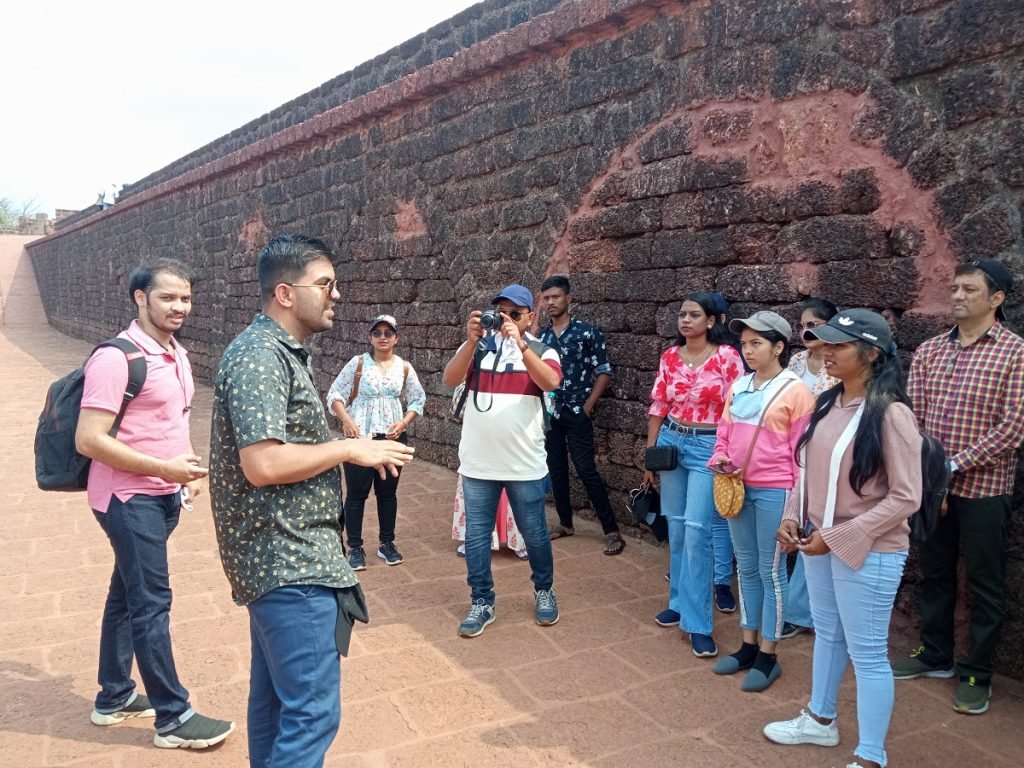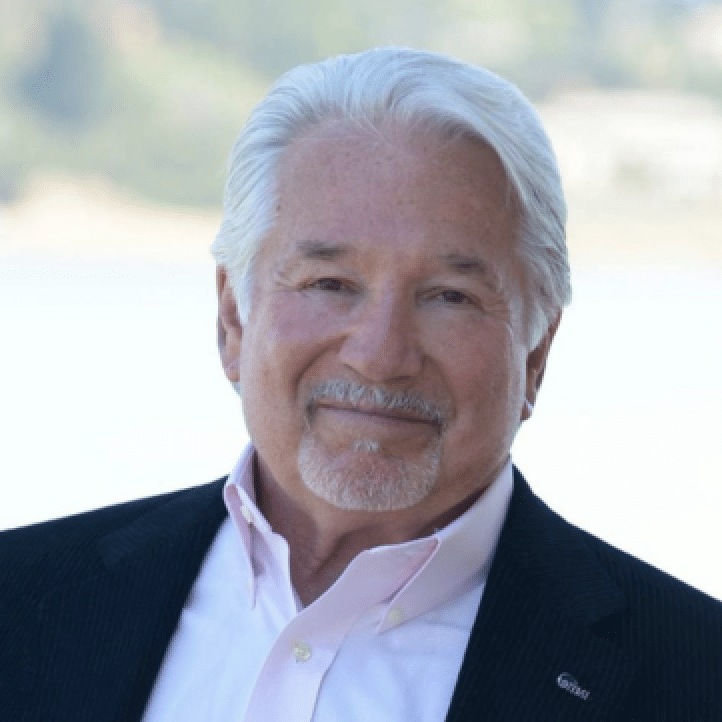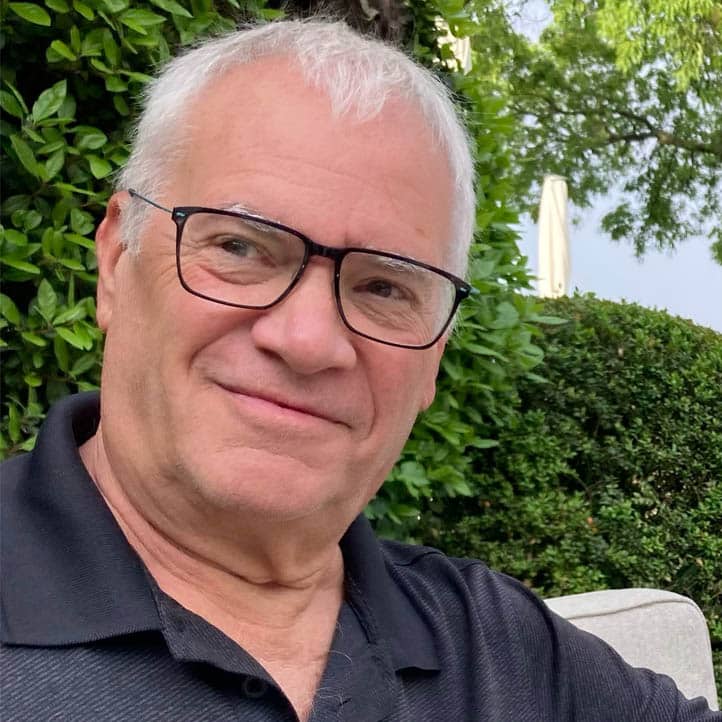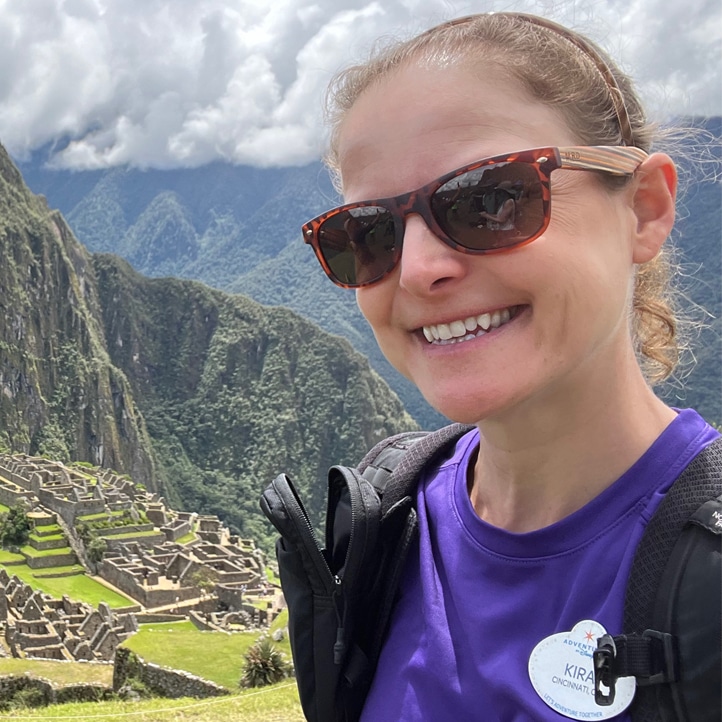Becoming a Tour Manager: Responsibilities, Skills, and Salary
Are you a recording artist looking to hit the road and embark on a successful tour? Or perhaps you’re simply curious about the role of a tour manager and what they bring to the table. Look no further, as this article is here to shed light on the world of tour managers and their invaluable contributions to the music industry. (Photo by Aleksandr Popov on Unsplash .)
Discover GRAMMY GO courses exclusively on Coursera

Building Your Audience for Music Professionals
Music production: crafting an award-worthy song.
Tour managers are the unsung heroes behind the scenes, ensuring that every aspect of a tour runs smoothly. From planning and logistics to financial management and artist well-being, they wear multiple hats to ensure a seamless experience for both the artist and the audience. But what exactly does a tour manager do? And how can you find the right one for your needs? Join us as we delve into the world of tour managers and uncover the key qualities to look for when hiring one.
Whether you’re an aspiring artist or a curious music enthusiast, understanding the role of a tour manager is crucial in navigating the complex world of touring. So, let’s discover the essential tasks and responsibilities of tour managers, as well as where to find them and how much they typically cost. Get ready to unlock the secrets behind successful tours and the key players who make it all happen.
What Is A Tour Manager?
A tour manager is a crucial member of an artist’s team, especially when it comes to touring. Their role is to ensure that everything runs smoothly before, during, and after the show. From planning and logistics to financial management and artist well-being, tour managers handle a wide range of responsibilities to make the tour a success.
Tour managers serve as the lynchpin of the entire touring cycle. They travel alongside the artist and the crew, overseeing all aspects of the tour. They are responsible for coordinating venues, transportation, accommodations, and other logistical details. This ensures that the artist and their team can focus on their performances without distractions or disruptions.
In addition to the logistical aspects, tour managers also serve as a personal manager to the artist. They play a vital role in ensuring the artist’s overall well-being throughout the tour. This includes managing schedules, handling day-to-day tasks, and addressing any concerns or issues that may arise. A tour manager’s ultimate goal is to ensure that both the tour and the artist are successful and thriving.
It’s worth noting that tour managers often double as personal managers. This means that they not only oversee the logistics of the tour but also manage all aspects of an artist’s life. They are responsible for not only ensuring a smooth-running tour but also ensuring the artist’s happiness and well-being.
A tour manager is a highly skilled professional who plays a crucial role in the success of an artist’s tour. They handle everything from logistics to financial management and artist well-being. With their expertise and dedication, tour managers ensure that the tour runs smoothly, allowing the artist to focus on delivering outstanding performances.
What does a Tour Manager do?
Roles & responsibilities.
A tour manager plays a crucial role in the smooth running of a tour. They are responsible for managing all aspects of the tour, both before and during the shows. Here are some key roles and responsibilities of a tour manager:
- Logistics Management : A tour manager is in charge of coordinating all logistics related to the tour. This includes arranging travel accommodations, booking transportation, and ensuring that all equipment and merchandise needed for the shows are organized and ready.
- Financial Management : Tour managers work closely with artist management and business management to create a tour budget. This budget serves as a roadmap for all financial decisions during the tour, from choosing hotels to hiring crew members. They also handle various financial transactions throughout the tour, such as paying vendors and ensuring that everyone is paid correctly and on time.
- Artist Well-being : Alongside managing the tour, tour managers also serve as personal managers, taking care of all aspects of an artist’s life on the road. They ensure that the artist is comfortable, happy, and well taken care of. This can involve arranging for personal needs, such as dietary requirements or specific accommodations, and addressing any issues that may arise during the tour.
- Team Coordination : Tour managers are responsible for managing the entire crew involved in the tour, including band members, roadies, and technical staff. They ensure that everyone is working together cohesively and that tasks are being completed efficiently. This involves overseeing rehearsals, sound checks, and coordinating schedules.
- Problem Solving : In the fast-paced environment of a tour, unexpected challenges can arise. Tour managers are skilled problem solvers who handle any issues that may come up, whether it’s a technical glitch during a show or last-minute changes to the itinerary. They remain calm under pressure and find solutions quickly to keep the tour running smoothly.
- Tour Documentation : Tour managers also handle various administrative tasks, such as managing contracts and legal documents related to the tour. They keep detailed records of expenses, receipts, and other important documents to ensure a smooth reconciliation process after the tour.
Tour managers are the lynchpin of the entire touring cycle. They handle a wide range of responsibilities, from logistics management to financial and artist well-being. Their expertise and dedication ensure that the tour runs smoothly and that the artist can focus on delivering outstanding performances.
How To Become A Tour Manager
Qualifications & skills.
To become a tour manager, there are certain qualifications and skills that aspiring individuals should possess. While a bachelor’s degree is not always required, it can be helpful in gaining the necessary knowledge and skills for the role. Some relevant fields of study include music business, music industry studies, business management, marketing, or related areas.
In addition to formal education, practical experience in the music industry is highly valuable. Many tour managers start their career by working in various roles within the industry, such as live sound, venue management, or working closely with artists. This hands-on experience allows aspiring tour managers to learn the ins and outs of the industry and develop essential skills.
Some key skills that tour managers should possess include:
- Strong organizational and planning abilities are crucial for managing all aspects of a tour, including scheduling, logistics, and travel arrangements.
- Excellent communication and interpersonal skills are necessary for effectively coordinating with artists, crew members, venues, and other stakeholders.
- Problem-solving skills are essential for addressing any issues or challenges that may arise during the tour and finding effective solutions.
- Financial management skills are important for handling budgets, negotiating deals, and ensuring financial success of the tour.
- Attention to detail is vital for ensuring all necessary arrangements and requirements are met, such as visas, travel documentation, and equipment.
Schools & Degrees
While there is no specific degree required to become a tour manager, obtaining a degree in a music-related field can be beneficial. Many universities and music schools offer programs in music business, music industry studies, or related disciplines. These programs provide a solid foundation in the business and management aspects of the music industry.
Some recommended courses to take during the degree program include psychology, business law, logistics, accounting, or tourism and travel management. These courses can provide additional knowledge and skills that are applicable to the role of a tour manager.
In addition to formal education, seeking internships or entry-level positions with music promoters, record labels, or concert venues can provide valuable hands-on experience and networking opportunities. Learning directly from experienced tour managers can offer insights into the daily responsibilities and challenges of the role.
If you’re a tour manager aiming to enhance your market value by building your personal brand, consider enrolling in GRAMMY GO ‘s ‘ Building Your Audience for Music Professionals ‘ specialization on Coursera . This course provides essential insights into branding not only for creators but also for creative teams. In today’s industry, every professional stands to benefit from cultivating a strong personal brand. This specialization will equip you with the skills necessary to effectively promote and distinguish yourself in the competitive music business landscape.
Tour Manager Salary
One of the key factors that people consider when pursuing a career is the potential salary. For those interested in becoming tour managers in the music industry, it is important to understand the earning potential in this role.
According to Salary.com , In Los Angeles, CA, the average salary for a Tour Manager is $124,177. The salary range usually varies between $103,589 and $143,528 based on factors such as education, certifications, additional skills, and years of experience in the field.
$124.177K AVG
It is worth noting that these figures represent an average, and there are opportunities for higher salaries, especially for those who work with high-profile artists. Additionally, the length and frequency of tours can also impact the overall income of a tour manager.
While the salary range is important to consider, it is essential to remember that being a tour manager offers other benefits that go beyond monetary compensation. Here are some additional advantages that come with being a tour manager:
Challenges & Rewards
Advantages & disadvantages of being a tour manager.
While the salary range is important to consider, being a tour manager in the music industry comes with its own unique set of challenges and rewards. Let’s take a closer look at the advantages and disadvantages of pursuing a career as a tour manager.
Advantages:
- Travel Opportunities : One of the most exciting aspects of being a tour manager is the chance to travel to different cities and countries. Tour managers get to explore new places, experience different cultures, and create unforgettable memories along the way.
- Networking Opportunities : Tour managers have the opportunity to connect with various industry professionals, including artists, promoters, agents, and venue managers. These connections can open doors to future opportunities and collaborations.
- Job Security : The demand for talented and experienced tour managers is high in the music industry. With the continuous growth of live music events and tours, tour managers can enjoy a stable and secure career.
- Variety of Responsibilities : As a tour manager, no two days are the same. From coordinating logistics to managing finances and ensuring artist well-being, tour managers have a wide range of responsibilities that keep them engaged and challenged.
Disadvantages:
- Long Hours and Workloads : Tour managers often work long and irregular hours. They are responsible for overseeing every aspect of the tour, from planning and logistics to problem-solving and troubleshooting. This can result in extended workdays and periods of high stress.
- Constant Travel : While travel can be exciting, it can also be physically and mentally demanding for tour managers. Constantly being on the road and away from home can lead to fatigue and a lack of personal time.
- High-pressure Environment : Tour managers are responsible for ensuring that everything runs smoothly during the tour. From managing unexpected challenges to dealing with last-minute changes, tour managers need to thrive in a high-pressure environment and think quickly on their feet.
- Limited Personal Life : Due to the nature of their work, tour managers may have limited time for personal relationships and hobbies. The demanding schedule and constant travel can make it challenging to maintain a healthy work-life balance.
Overall, being a tour manager can offer a rewarding and fulfilling career in the music industry. However, it’s important to weigh the advantages and disadvantages before pursuing this path. If you thrive in a fast-paced and high-pressure environment, enjoy traveling, and have a passion for music and live events, becoming a tour manager can be an exciting and fulfilling choice.
Tools & Equipment
Tour managers rely on a range of tools and equipment to effectively execute their responsibilities and ensure smooth operations during a tour. From planning and logistics to financial management and artist well-being, these tools help streamline processes and enhance efficiency. Here are some of the key tools and equipment that tour managers utilize:
- Project Management Software : Tour managers often use specialized software designed for collaboration and project management. These platforms offer features including budget tracking and task management. With these tools, tour managers can keep track of important details, communicate with team members, and stay organized throughout the tour.
- Communication Devices : Effective communication is crucial for a tour manager’s success. They rely on devices such as smartphones, walkie-talkies, and two-way radios to stay connected with the entire team, including crew members, artists, vendors, and venue staff. These tools enable quick and seamless communication, allowing tour managers to address issues promptly and coordinate operations effectively.
- Financial Management Tools : Managing budgets and expenses is an essential part of a tour manager’s role. They use financial management tools, such as accounting software or spreadsheets, to track costs, manage invoices, and evaluate financial performance. These tools help tour managers ensure that expenses are within the allocated budget and provide accurate financial reports to the artist and management team.
- Travel and Accommodation Resources : Tour managers and their teams handle the logistics of travel and accommodation for the entire touring party. They rely on online booking platforms, travel agencies, and hotel reservation systems to secure transportation arrangements, hotel accommodations, and other travel-related services. These resources help tour managers ensure that all logistical arrangements are in place, ensuring a comfortable and efficient experience for everyone involved.
- Emergency and Safety Equipment : Safety is a top priority for tour managers, and they are responsible for preparing for emergencies or unforeseen situations. They carry first aid kits, emergency contact lists, and other safety equipment to handle medical emergencies, accidents, or other crises that may arise during the tour. Having the necessary equipment readily available allows tour managers to respond promptly and effectively in challenging situations.
By leveraging these tools and equipment, tour managers can navigate the complexities of tour management with ease. These resources enable them to stay organized, communicate effectively, manage finances, and address any issues that may arise during the tour.
Famous Tour Managers
Frequently asked questions, who employs a tour manager.
Tour managers are hired by booking agents or artist managers to organize logistics, personnel, communications, and schedules for concert tours.
What is the difference between a manager and a tour manager?
A tour manager plans and ensures smooth tours, while a business manager handles overall career and business affairs of an artist or band.
What is the job outlook for a tour manager?
Tour manager jobs are in demand, with a projected 8% growth from 2018 to 2028 in the United States.
What is the daily life of a tour manager?
Tour managers handle travel plans, venue coordination, financial management, media interactions, and local services at each tour stop to ensure smooth operations.
Build your future in music.
GRAMMY winners and nominees, Recording Academy members, and industry pros offer real-life lessons you can put to work right away.
Be the first to find out about GRAMMY GO courses, articles, and more.
- Music Career Finder
Start Here:
- I am a musician or performer
- I just want to work in the music business
- Singing (or Rapping)
- Songwriting (& Lyrics)
- Music Production
- Music Recording
- The Music Business
- Piano & Keyboard
- Guitar (& Bass)
- Music Journalism & Writing
- Live Sound Tech
- Bass Guitar
Tour Manager
Career Overview
A Tour Manager manages transportation, scheduling, and the financial aspects of an artist’s time on the road.
Alternate Titles
Road Manager, Concert Tour Manager
Avg. Salary
Salary Range
$46K – $71K 1
Table of Contents
Career Description
Career outlook, career path, experience & skills, education & training, additional resources.
How To Rap: Insights From the Great Rappers
How To Read Sheet Music: Simple Guide for Newbies
Why You Need an EPK, How To Make One, and How To Use It
Music Production: All the Steps to Get Started
What Is Audio Engineering? Here’s How To Get Started…
Becoming A Vocalist: Follow These Steps
How To Write Song Lyrics: 15 Tips To Get You Started
10 Best Music Schools In The World
Music Scholarship Tips for College Students
How to Write Lyrics: 8 Steps to Write Your Best Song Lyrics Ever
Songwriting Tips, Techniques, and Ideas for Beginner Songwriters
Exploring Audio Careers at Full Sail University’s Hall of Fame Week
Record Labels Looking for Artists: How Do You Get Signed?
The Best Ways to Make Music Online For Free
How To Sing: The Complete Guide for Beginners
Songwriting 101: a Step-by-Step Guide (and Songwriting Tips)
What Is a DAW? Digital Audio Workstations Explained (Simple Guide)
Learn to Sing: What Is the Best Way to Learn Singing?
Best Music Schools 2024: Who Has the Best Music Programs?
Best Online Guitar Lessons: Can I Learn Guitar Online?
How To Become a Tour Manager
People also ask.
What is the role of a tour manager?
What education is needed to become a tour manager?
Do tour managers make a lot of money?
The job of a Tour Manager is to make sure that life on the road runs smoothly for everyone involved. This means getting the band safely to venues and hotels, managing money coming in and money going out, and dealing with Promoters , Ticket Service Directors and Venue Managers .
Tour Manager David Norman says that his “day consists of moving the artist and the band from city to city. Along with my Travel Agent, Tour Coordinator , Tour Bus Driver , Tour Publicist , booking flights, ground, hotels, etc. Doing day sheets (info on what your day will be like including departure times, showtimes, soundcheck times, travel after the show, etc.)”
Tour Managers also work with Band Directors , Travel Agents, Band Members, Sound and Lighting Techs , Instrument Techs ( Guitar Technicians , etc.), Sound Engineers , Tour Bus Drivers , Tour Coordinators , Production Managers , Tour Accountants, Advance Person , Festival Directors and the Road Crew .
A tour manager is the logistical backbone of an artist’s tour, overseeing all aspects of planning, coordination, and execution to make sure everything runs smoothly. This includes organizing transportation, accommodations, budgeting, negotiations with venues, and schedules for the touring party. And the touring party often includes musicians, crew members, and support staff. Many times, a tour manager will stand in as one of the band members.
On average, Tour Managers earn approximately $54,300 annually. The average salary range for Tour Managers runs from $46,000 to $71,000.
Tour Managers are paid week-by-week, and payment varies based on the tour budget, the length of the tour, the stature of the band, etc. Usually, a Tour Manager gets a base salary, plus expenses (meals, for example), and sometimes a per diem for incidental expenses that come up on the road.
The income of tour managers vary widely depending on things like the size and popularity of the artists they work with, the length and scale of the tour, and their level of experience and expertise. Tour managers, especially those just starting out or managing indie acts, usually make enough to get by. But you should’t expect to get rich by being a tour manager. If you’re up for the responsibility and living life on the road, it can be a rewarding and fulfilling career.
Hey, what do you think about trying our new Music Career Helper Music Career Helper really quick? It’s totally free and could help get your career moving fast! Give it a try. It’s totally free and you have nothing to lose.
Tour Managers have a lot of responsibility, and not a lot of days off. Norman says, “I generally work at least 8 – 9 months out of the year. I’m a workaholic and need projects to keep me motivated.”
The best way to advance in this career is to have a handle on several different aspects of touring so that you can work in varying capacities. Norman says that “when I was coming up, my mentor advised me to learn EVERYTHING about touring, so I did. I can tour manage, production manage, [do] tour accounting, Promoter Rep, etc. Learning all of these different things will make your phone ring with more jobs over being just one dimensional.
“For example, this year I was the Tour Manager/Tour Accountant for John Legend (finished in February after 5 ½ years touring with him). Then I filled in as Tour Manager for a one-off date for Aaron Neville and then was Tour Director for the Brit Floyd tour and then Production Manager for Prince.
“In two weeks, I’ll go out as Tour Accountant for Avicii (filling in for a friend) and then I go out with One Direction as Promoter Rep August – October.” Advancement also comes from experience and building connections; most Tour Managers start with smaller, lesser-known bands before hitting the road with Grammy-winning, millionaire Rock Stars .
Like so many music industry careers, networking and word-of-mouth recommendations are the best way to get a job as a Tour Manager. Many Tour Managers start off by working with a friend’s band or in another music industry career.
UK-based Tour Manager Bob Slayer says, “There are so many ways to get into a career in music but like any creative field most of them involve working for next to nothing for quite a while, this is because a lot of people want to follow this path, so if you won’t work for nothing there are plenty of other people who will and they will get the breaks.
“If you have some aptitude for what you do then there comes a time where the experience and knowledge you have picked up working endless free or low paid hours begin to make you a scarcer, more valuable commodity.
“Back in 2002/2003, I was trying to get into music journalism. I was reviewing bands for a bunch of fanzines and just starting to get the odd bit of work from magazines. I interviewed a band by email – Electric Eel Shock, a Japanese band who were touring America at the time.
One of the questions I asked them was “Do you have any plans to come to the UK?” and this was the only one they answered! ‘You get gig; we come.’ And so I did.
“A few weeks later they came and stopped on my floor and did a few gigs around London. They blew a few people away and were asked to support a couple of larger bands.
The band then, impressed with what I had set up, invited me to go back to [the] USA with them and to SXSW. There I set up an interview with MTV for them and managed to get the head Booker from Roskilde Festival in Denmark to come see them live.
“She immediately booked them to headline a stage… This sealed it and they asked me to be their Manager . This I did for the next 6 years solid as well as tour managing and also acting as Agent in some territories.
I still work with them and just set up a European tour with them. Working and touring with Electric Eel Shock led to working with a number of other artists such as The Bloodhound Gang, Public Enemy, MC Devvo, etc.”
- Start at the bottom. Get experience in different facets of the live music industry.
- Network. Get the word out that you’re available to work as a Tour Manager.
- Be willing to work for free or very little.
- Brush up your budgeting skills.
- Stay responsible and don’t get sucked into partying! You’re the one who needs to see that everyone gets to the next location safely and on time.
Norman, like many Tour Managers, started off as a musician himself. This experience gave him an understanding of what tour life was like, and what band members would need from their Tour Manager. He also has experience as a recording studio Sound Engineer and Mixer.
After working with the S.O.S. Band on an album, they asked him to come along on tour with them as a Front-of-House Engineer and Tour Manager. In general, Tour Managers have experience in one or more music industry careers before heading out with a band. Skill-wise, they must be able to handle finances, stay on schedule and handle all kinds of people with varying temperaments.
Working as Tour Manager isn’t for everybody. Norman says this is a good career for “someone who’s patient, is proactive instead of reactive and is a forward-thinker and can multitask!”
”Learn everything you can,” Norman says. “Read everything you can and above all, find a mentor to help guide you. College would be great to learn people and life skills.” Although higher education isn’t a requirement, an understanding of finance and budgeting is.
You don’t necessarily need a formal education, but a degree in music business or a related field can help. The more important thing is getting experience, being passionate about the artists and tours you manage. It can help to first go on tours as a different member of the tour crew, like the road crew, merch crew, or just general support crew.
There are no unions for Tour Managers, although UK-based Tour Manager Bob Slayer recommends the Music Managers Forum for those interested in artist management.
This site has some useful insight into the business of being a Tour Manager .
What skills do you need to be a Tour Manager?
To be successful, Tour Managers need skills in time management, interpersonal communication, budgeting and finance. They must be able to solve issues on the fly, deal with all kinds of people, and ensure everyone’s having a good time.
Most Tour Managers know the music industry inside-and-out, having worked in some other capacity before getting into tour management. It can be helpful to have an understanding of live concert sound, performance gear, and musical instruments.
What education do you need to be a Tour Manager?
Majoring in Music Business or Music Industry Studies as an undergraduate can be helpful for aspiring Tour Managers. However, many Tour Managers get all the education they need through working in various music industry roles such as live sound, venue management, and performance. These positions help them get to know what life on the road is like.
What they haven’t already learned, they learn on the road.
Who goes on tour with an artist?
Touring is big business and therefore all kinds of people go on tour along with an artist. Some people you might find on the tour bus include the Tour Manager, Production Manager , Roadies / Stagehands , Tour Bus Driver , Guitar Tech , Lighting Tech , Background Singers , musicians, and the people selling shirts, tote bags, and other memorabilia at the merch tent.
What is the single biggest suggestion you would give to someone wanting to get into this career?
Bob Slayer says, “Get whatever experience under your belt. Bands always need to get to gigs, if you want to make yourself indispensable, buy yourself a van and offer yourself for free, or for expenses, or cheaply to bands. Maybe you don’t always want to tour but it will give you an insight into the goings-on of bands and you should be able to go from there into other areas.
“One fan of Electric Eel Shock used to come to all their gigs and so when I couldn’t tour manage them for a while I asked him if, in return for us taking him to the gigs, he would do some production. He said yes and became their Tour Manager for a while. Another fan got Electric Eel Shock a feature in his local newspaper.
“I encouraged him to do some more and he got us features in several other local newspapers on the tour. I introduced him to other bands he could also help out and within a year he packed in his job and started a PR company.”
What’s the #1 mistake people make when trying to get into this career?
Slayer: “Being a dick!”
Norman: “Thinking that it’s all glamorous and so easy. It’s definitely NOT. Also, people who think they know it all. I learn stuff each and every day from people who know less than me, to people who have much more knowledge and wisdom than myself.”
What is the question people should ask about this career but rarely do?
Slayer: “What the feck am I doing?”
Norman: “Do you think this would be right for me based on my personality?”
What is one thing I should have asked which I didn’t?
Norman: “I’ll have to think on that one. GREAT QUESTION!”
If you could describe in one word what makes you successful, what would it be?
Slayer: ‘I am far from successful—but I am happy!”
Norman: “Diligence.”
Extra Credit: The Beatles or Rolling Stones?
Slayer: “There was a time when this was a polarizing question. You were in one camp or the other. There have been many other this band vs. that band. But I think it is hard to say anything other than both.”
Norman: “Beatles. The Rolling Stones are SOOOOOOO overrated.”
David Norman & Bob Slayer
David Norman is a veteran Tour Manager who has worked as a musician, Recording Engineer and Mixer, Tour Accountant, and Production Manager. From 2008-2014 he worked as the Tour Manager/Tour Accountant for John Legend and recently worked with Prince on his European/UK tour. Norman has worked with stars like Robert Plant & Alison Krauss, Toni Braxton, Arcade Fire, Joss Stone, Alicia Keys, Green Day, and They Might Be Giants.
He has been profiled on Roadies of Color United , FOH Online , and Billboard .
Bob Slayer is a Tour Manager in the UK, where he has worked with Snoop Dogg, Electric Eel Shock, Iggy & the Stooges, Public Enemy, The Bloodhound Gang, and the Magic Numbers. In addition to his work with live music, he also now works with Comedians. He has appeared at the Edinburgh Fringe Festival every year since 2008 and is himself an award-winning Comedian.
- 1 . "Tour Manager Salaries" . Glassdoor.com. published: Dec 22, 2019. retrieved on: Nov 7, 2019
Most Recent Articles
Gear & software.
Best Vocal Mic 2024 for Studio and Home Recording
Best Synthesizers for the Biggest Sounds in 2024
Best Music Production Apps: Our Top 16 Picks
- Music Careers
- Industry Insights
- Gear & Software
Music Schools
- Career Resources
- Music School Finder
- Music School Advice
- Music Production Schools
- Online Music School
- Music Scholarships
- Music Schools In Canada
- Music Schools In The UK
Get in Touch
CareersinMusic.com 2525 Arapahoe Ave, Suite E4-801 Boulder, CO 80302
Do Not Sell My Personal Information
- Terms of Service
- Privacy Policy
Top 10 Tour Manager Certifications
Updated July 22, 2023 18 min read
Certifications are important for a tour manager in the job market because they demonstrate to potential employers that the individual has the necessary knowledge, skills, and experience to effectively manage tours. They also provide assurance that the manager is knowledgeable about industry best practices and safety regulations. Additionally, certifications can help tour managers stand out from other candidates when applying for positions and can be used to negotiate higher salaries. Finally, having certifications can open up opportunities for professional development and networking.
The purpose of this article is to review the top certifications for Tour Managers and discuss how they can contribute to a successful career in the field.
What are Tour Manager Certifications?
Tour Manager Certification is a qualification that has been developed to help people who are interested in becoming professional tour managers. It is designed to give individuals the knowledge and skills they need to manage tours effectively, safely and legally. The certification covers topics such as customer service, risk management, financial management and operations.
By achieving this certification, individuals can demonstrate their commitment to professionalism in the industry and prove that they possess the necessary skills to manage tours successfully. Tour Managers who have this certification are more likely to be hired for positions with greater responsibility and higher pay. They will also be better equipped to handle any problems or issues that arise during a tour as well as ensure tour participants have an enjoyable experience.
Furthermore, having this certification can open up opportunities for further career progression such as working in a supervisory role or even setting up their own business. It will also enable them to network with other professionals within the industry which could lead to further job opportunities.
Overall, Tour Manager Certification can provide individuals with the essential skills and knowledge they need to excel in their chosen profession, while also providing them with an opportunity for career advancement.
Pro Tip: Make sure to research the different tour manager certification programs available in your area and find one that fits your needs and budget. Make sure that the program is accredited by the appropriate bodies and covers topics such as tour operations, customer service, budgeting, marketing, and logistics. Having a certification can help you stand out from other tour managers and make you more attractive to potential employers.
Related : What does a Tour Manager do?
Here’s our list of the best certifications available to Tour Managers today.
1. International Tour Management Institute (ITMI) Certified Tour Manager
The International Tour Management Institute (ITMI) Certified Tour Manager is a professional designation for tour managers and guides. It is the only certification program in the world that is recognized by the travel industry. The ITMI Certified Tour Manager program is designed to provide tour managers with the knowledge, skills, and abilities needed to be successful in their roles.
The ITMI Certified Tour Manager program consists of three courses: Introduction to Tour Management, Advanced Tour Management, and Professional Practices. Each course takes approximately one month to complete and includes online lectures, readings, quizzes, and exams. Upon successful completion of all three courses, students become eligible for certification as an ITMI Certified Tour Manager.
To get certified as an ITMI Certified Tour Manager, students must first complete all three courses in the program. They must also pass a comprehensive exam that covers topics such as tour operations management, customer service protocols, safety regulations, marketing strategies, and more. Once they have passed the exam they can submit their application for certification along with supporting documentation such as proof of work experience or education in tourism or hospitality management.
The cost of the ITMI Certified Tour Manager program varies depending on which institution you take it through but typically ranges from $1,500 - $2,000 USD for all three courses combined.
2. Certified Travel Industry Professional (CTIP)
Certified Travel Industry Professional (CTIP) is a professional certification program for travel industry professionals. It is administered by the Institute of Certified Travel Agents (ICTA). The certification is designed to recognize and reward individuals who demonstrate a high level of knowledge and expertise in the travel industry.
To earn the CTIP certification, applicants must pass an exam that covers topics such as customer service, sales and marketing, business operations, and regulations. The exam consists of 100 multiple-choice questions and takes approximately two hours to complete. Applicants must also have at least three years of experience in the travel industry in order to be eligible for the certification.
The cost to take the CTIP exam is $195 USD. Once an applicant has passed the exam, they will receive a certificate and be recognized as a Certified Travel Industry Professional.
3. Certified Tourism Ambassador Program (CTAP)
The Certified Tourism Ambassador Program (CTAP) is a professional development program designed to enhance the knowledge, skills and abilities of those involved in the tourism industry. It is a comprehensive training program that covers topics such as customer service, destination knowledge, marketing and sales, and event planning.
The CTAP program consists of three levels of certification: Certified Tourism Ambassador (CTA), Certified Tourism Professional (CTP), and Master Certified Tourism Professional (MCTP). The CTA level is the entry-level certification, which requires completion of an online course and passing a multiple-choice exam. The CTP level requires completion of an additional online course and passing a more detailed exam. The MCTP level requires completion of two additional courses and passing a more detailed exam.
The cost for the CTAP program varies depending on the level desired. The CTA level costs around $90 USD, while the CTP level costs around $200 USD. The MCTP level costs around $300 USD.
In order to get certified through the CTAP program, you must first register with the organization and pay any applicable fees associated with your desired certification level. Once registered, you will have access to all of the necessary materials needed for each course or exam. Depending on how quickly you complete each course or exam, it can take anywhere from one week to several months to become certified through this program.
4. International Society of Travel and Tourism Professionals (ISTTP) Certified Tour Manager
The International Society of Travel and Tourism Professionals (ISTTP) Certified Tour Manager is a professional certification program designed to recognize the knowledge and skills of experienced tour managers. The certification is based on a comprehensive exam that covers topics such as customer service, tour operations, marketing, finance, risk management, and more.
To become an ISTTP Certified Tour Manager, applicants must first meet the eligibility requirements which include having at least three years of experience in the tourism industry. Applicants must also pass an online examination which consists of multiple-choice questions about various aspects of tour management. Once applicants have passed the exam, they will receive their ISTTP Certified Tour Manager certificate.
The cost for taking the ISTTP Certified Tour Manager exam varies depending on where you take it. Generally speaking, it costs around $200-$300 USD for the exam fee itself. Additionally, there may be other fees associated with taking the exam such as registration fees or travel expenses if you need to take the exam at a testing center outside of your local area.
In total, it usually takes around two weeks to complete all steps necessary to become an ISTTP Certified Tour Manager. This includes submitting your application and passing the online examination. After successfully completing these steps, you will receive your certificate within four weeks.
5. National Tour Association (NTA) Certified Tour Manager
The National Tour Association (NTA) Certified Tour Manager (CTM) is a professional certification program that recognizes individuals who have achieved a high level of expertise in the tour and travel industry. The CTM designation is designed to recognize those who have demonstrated superior knowledge and skills in the areas of tour operations, customer service, safety, marketing, and business management.
To become a CTM, you must meet certain criteria set by NTA. This includes having a minimum of three years' experience as a tour operator or tour manager; completion of at least four NTA-approved courses related to the field; and passing an exam administered by NTA. It typically takes about six months to complete all the requirements for the CTM designation.
In order to get the CTM designation, you must first submit an application to NTA along with your resume and proof of experience. Once your application is accepted, you will be required to complete four approved courses related to tour operations, customer service, safety, marketing, and business management within six months. Once these courses are completed successfully, you will then need to pass an exam administered by NTA in order to receive your CTM designation.
The cost for obtaining the CTM designation varies depending on whether you are an individual or part of an organization. Individual members can expect to pay around $500 for the application fee plus course fees while organizations may pay up to $1,000 for their applications plus course fees.
6. Adventure Travel Trade Association (ATTA) Certified Tour Manager
The Adventure Travel Trade Association (ATTA) Certified Tour Manager is a professional certification program that recognizes the highest standards of excellence in adventure travel tour management. The certification is designed to ensure that tour managers have the knowledge, skills, and competencies necessary to lead successful and safe adventure travel tours.
To become an ATTA Certified Tour Manager, an individual must first complete a training program provided by an ATTA-accredited provider. This training program consists of online courses, on-site seminars, and field trips designed to equip individuals with the knowledge and skills required to be a successful tour manager. After completing the training program, applicants must pass a written exam administered by the ATTA. Upon passing this exam, applicants are awarded the ATTA Certified Tour Manager designation.
The cost of becoming an ATTA Certified Tour Manager varies depending on which accredited provider you choose for your training program. Generally speaking, it can cost anywhere from $500-$1000 USD to become certified. Additionally, some providers may charge additional fees for materials or other services associated with their training programs.
In total, it typically takes 4-6 weeks to become an ATTA Certified Tour Manager once you begin your training program.
7. American Bus Association (ABA) Certified Tour Manager
The American Bus Association (ABA) Certified Tour Manager (CTM) program is a professional certification program designed to recognize and reward the highest standards of tour management. A CTM is a professional who has been certified by the ABA as having achieved a high level of knowledge and experience in the tour management field.
To become an ABA Certified Tour Manager, applicants must first meet certain eligibility requirements, including:
* At least five years of full-time employment in the tour management industry or related fields
* At least three years of experience managing tours
* Possession of a valid driver’s license
* Completion of at least 50 hours of continuing education related to tour management
* Successful completion of the ABA’s CTM examination.
Once these requirements have been met, applicants must complete an application form and submit it along with payment for the exam fee. The exam fee is $150 for members and $200 for non-members. Once approved, applicants can then take the CTM examination at any one of several testing centers across the United States. The exam consists of 100 multiple choice questions covering topics such as customer service, safety regulations, marketing principles, and financial management. Applicants must score at least 80% on this exam in order to become certified as an ABA Certified Tour Manager.
Once certified, CTMs are required to maintain their certification by completing at least 20 hours of continuing education every two years. This requirement helps ensure that CTMs remain up-to-date on industry trends and best practices.
8. Destination Marketing Association International (DMAI) Certified Tour Manager
Destination Marketing Association International (DMAI) Certified Tour Manager is a professional certification program that recognizes the highest standards of tour management. It is designed to provide tour managers and their organizations with the knowledge and skills needed to effectively manage tours while delivering a high level of customer service.
To become DMAI Certified, individuals must complete an online course, pass an exam, and submit a portfolio demonstrating their experience in tour management. The course typically takes between 10-12 hours to complete and covers topics such as customer service, marketing, operations, finance, risk management, and legal considerations. Once completed, individuals must pass an exam with a score of 70% or higher in order to receive certification.
The cost for the certification program is $495 USD. This fee includes access to the online course materials as well as the exam fee. Upon successful completion of the program, individuals will receive a certificate from DMAI recognizing them as a Certified Tour Manager.
9. Professional Convention Management Association (PCMA) Certified Tour Manager
The Professional Convention Management Association (PCMA) Certified Tour Manager (CTM) program is a professional certification program that provides tour managers with the knowledge and skills to effectively manage tours and travel programs. The CTM program is designed to help tour managers develop the necessary skills to lead successful and safe tours, provide excellent customer service, and create memorable experiences for their customers.
The CTM program consists of an online course, which is divided into four modules: Tour Planning & Preparation, Tour Execution & Management, Risk Management & Safety, and Customer Service. The course takes approximately 8-10 hours to complete, depending on the individual’s learning speed. Upon completion of the course, participants must pass a final exam in order to receive their certification.
To get certified as a PCMA CTM, you must first register for the online course through the PCMA website. The cost of registration is $299 USD. After completing the course and passing the final exam, you will receive your certification from PCMA. Certification must be renewed every two years by completing additional training courses or attending conferences related to tour management.
10. Meeting Professionals International (MPI) Certified Tour Manager
Meeting Professionals International (MPI) Certified Tour Manager is a certification program designed to recognize the achievements of tour managers who have demonstrated excellence in their profession. The certification is awarded by MPI, a leading global association for meeting and event professionals.
The certification process requires applicants to demonstrate knowledge and experience in the areas of tour management, customer service, safety and security, risk management, budgeting and financial management, and marketing. Applicants must also pass an exam administered by MPI.
The application process takes approximately two months to complete. Applicants must submit an application form along with proof of experience in the field of tour management. They must also pay a fee of $250 USD for the exam and processing fees. Once the application has been approved, applicants will receive an email with instructions on how to take the exam.
The exam consists of 100 multiple-choice questions that cover topics such as tour operations, customer service, safety and security, risk management, budgeting and financial management, marketing strategies, communication skills, problem solving skills, and more. Candidates must score at least 70% or higher on the exam in order to be certified as a Tour Manager by MPI.
Once certified as a Tour Manager by MPI, professionals can use the designation “MPI Certified Tour Manager” on their resume or business cards. This certification is valid for three years after which candidates must renew their certification by submitting proof of continuing education credits earned during that period.
Do You Really Need a Tour Manager Certificate?
The short answer is no. A tour manager certificate is not required in order to become a tour manager, but it may be beneficial depending on your situation.
For those who are looking to enter the field of tour managing, having a certificate can be a great way to demonstrate that you have the knowledge and skills needed for success. It also shows potential employers that you are dedicated to learning more about the industry, and that you take your career seriously. With a tour manager certificate, you can demonstrate your commitment to customer service and professionalism.
In some cases, having a tour manager certificate can also provide an advantage over other applicants when applying for jobs. Many employers prefer applicants with some kind of formal training or certification in order to give them assurance that they will be hiring someone who is knowledgeable about the industry. Additionally, having a certificate may also put you ahead of other candidates who don’t have one when competing for positions with limited slots available.
On the other hand, if you already have experience working as a tour manager or related field and feel confident in your abilities, then getting certified may not be necessary for you. Employers understand that experience can often trump education when it comes to hiring decisions, so if you have plenty of practical knowledge then skipping the certification process may be an option for you.
Ultimately, whether or not obtaining a tour manager certificate is right for you depends on your individual circumstances and goals as a professional in this field. It’s important to weigh all of your options before making any decisions so that you can make sure that whatever path you choose is best suited to helping reach your career objectives.
Related : Tour Manager Resume Examples
FAQs About Tour Manager Certifications
Q1. What is a Tour Manager Certification?
A1. A Tour Manager Certification is a credential that demonstrates an individual has the knowledge and skills needed to successfully manage tours and travel related activities. The certification is typically offered by professional organizations or educational institutions and requires successful completion of a course, exam, or other assessment.
Q2. How do I become certified as a Tour Manager?
A2. To become certified as a Tour Manager, you will need to complete an approved training program and pass an exam or other assessment to prove your knowledge and skills in the area of tour management. Depending on the organization offering the certification, you may also need to have relevant experience in tour management.
Q3. What topics are covered in a Tour Manager Certification?
A3. Topics covered in a Tour Manager Certification can vary but typically include customer service, group dynamics, risk management, tour planning and operations, budgeting and financial management, marketing fundamentals, legal aspects of tourism, industry standards and guidelines, cultural sensitivity, and more.
Q4. How long does it take to get certified as a Tour Manager?
A4. The amount of time it takes to get certified as a Tour Manager depends on the specific program you enroll in; however most programs require between one and three months of study time for completion.
Q5. Are there any special requirements for becoming certified as a Tour Manager?
A5: Yes - depending on the organization offering the certification program there may be additional requirements such as having prior work experience in tour management or submitting letters of recommendation from colleagues or employers in order to qualify for certification.
Editorial staff
Brenna Goyette
Brenna is a certified professional resume writer, career expert, and the content manager of the ResumeCat team. She has a background in corporate recruiting and human resources and has been writing resumes for over 10 years. Brenna has experience in recruiting for tech, finance, and marketing roles and has a passion for helping people find their dream jobs. She creates expert resources to help job seekers write the best resumes and cover letters, land the job, and succeed in the workplace.
Similar articles
- Top 10 Tour Coordinator Certifications
- Top 17 Tour Manager Resume Objective Examples
- What does a Tour Manager do?
- Top 11 Tour Guide Certifications
- Top 11 Tourism Management Certifications
- Top 18 Tour Coordinator Resume Objective Examples

Becoming a Tour Manager: A Comprehensive Guide

If you have a passion for travel, love organizing events, and enjoy working with people from different backgrounds, a career as a tour manager might be the perfect fit for you. As a tour manager, you will play a crucial role in ensuring the smooth running of tours, providing an unforgettable experience for travelers. In this comprehensive guide, we will explore the ins and outs of becoming a tour manager, from understanding the responsibilities to tips for career advancement. Let's dive in!
Understanding the Role of a Tour Manager
As a tour manager, you will be responsible for overseeing every aspect of a tour, from the planning and organization to the execution and completion. Your primary goal is to ensure that travelers have a memorable and enjoyable experience throughout the journey.
Imagine yourself standing in a bustling airport, surrounded by excited travelers ready to embark on their adventure. As a tour manager, you will be the guiding force behind their journey, ensuring that everything runs smoothly and seamlessly. From the moment they step off the plane to the final farewell, you will be there, orchestrating every detail.
But what exactly does it mean to be a tour manager? Let's dive deeper into the key responsibilities and skills required for this exciting role.
Key Responsibilities of a Tour Manager
As a tour manager, you will wear many hats. Some of your key responsibilities include:
- Managing logistics, such as transportation, accommodations, and meals
- Organizing sightseeing activities and excursions
- Providing information and assistance to travelers
- Handling emergencies and resolving any issues that may arise
- Building relationships with local service providers and suppliers
Imagine yourself navigating the labyrinthine streets of a foreign city, ensuring that the tour group arrives at their hotel safely and on time. You will be the mastermind behind the seamless coordination of transportation, making sure that everyone travels comfortably and efficiently. From arranging luxurious accommodations to selecting delectable meals that cater to various dietary preferences, you will be the architect of a truly unforgettable experience.
But it doesn't stop there. As a tour manager, you will also be the storyteller, weaving together fascinating historical and cultural narratives as you guide the group through iconic landmarks and hidden gems. Your knowledge and passion for the destinations will shine through as you share captivating stories and insider tips, making the journey come alive.
Of course, no journey is without its challenges. As the tour manager, you will be the problem-solver, ready to tackle any unexpected hurdles that may arise. From lost luggage to unforeseen weather conditions, you will think on your feet and find creative solutions to ensure that the tour continues smoothly.
Furthermore, building strong relationships with local service providers and suppliers is crucial. Your ability to connect with people from different backgrounds and cultures will not only enhance the tour experience but also create lasting partnerships that benefit both the travelers and the local communities.
Skills Required for the Job
To be an effective tour manager, you need a combination of hard and soft skills . Here are some of the key skills required:
- Excellent organizational skills: You will be juggling multiple tasks and deadlines, so the ability to stay organized is crucial.
- Strong communication skills: You will be interacting with travelers, service providers, and fellow team members, so effective communication is essential.
- Cultural sensitivity: You will work with people from diverse backgrounds, so being open-minded and respectful of different cultures is essential.
- Problem-solving abilities: As the tour manager, you will need to think on your feet and find solutions to unexpected challenges.
Imagine yourself effortlessly managing a complex itinerary, ensuring that every detail is meticulously planned and executed. Your organizational skills will be put to the test as you coordinate transportation, accommodations, and activities, all while ensuring that everything aligns seamlessly.
Effective communication will be your superpower. From providing clear instructions to the tour group to negotiating with local service providers, your ability to convey information and build rapport will be essential in creating a positive and enriching experience for everyone involved.
Cultural sensitivity is not just a skill, but a mindset. As a tour manager, you will have the privilege of immersing yourself in different cultures and interacting with people from all walks of life. Your openness and respect for diversity will foster meaningful connections and create a welcoming environment for travelers from around the world.
Finally, problem-solving will be your daily adventure. Whether it's rearranging an itinerary due to unforeseen circumstances or finding an alternative activity when faced with unexpected closures, your ability to think creatively and adapt quickly will ensure that the tour remains a seamless and unforgettable experience.
These skills can be developed through education and hands-on experience. Let's explore the path to becoming a tour manager.
The Path to Becoming a Tour Manager
Are you passionate about travel and have a knack for organizing and managing events ? If so, a career as a tour manager might be the perfect fit for you. In this expanding industry, tour managers play a vital role in ensuring that travelers have a seamless and enjoyable experience. While a specific degree is not always required to become a tour manager, there are certain educational and experiential steps you can take to increase your chances of success.
Educational Background
While a degree is not a prerequisite for becoming a tour manager, having a background in hospitality , tourism, or event management can give you a competitive edge. Many universities and colleges in the UK offer courses specializing in these areas. These programs provide a comprehensive understanding of the industry, covering topics such as customer service, marketing, logistics, and event planning. By enrolling in these courses, you can gain valuable knowledge and skills that will be directly applicable to your future career as a tour manager.
Additionally, gaining practical experience through internships or part-time jobs in the tourism and hospitality industry can provide valuable insights and help you build a solid foundation for your career as a tour manager. Working in hotels, travel agencies, or event planning companies can expose you to the inner workings of the industry and give you a firsthand understanding of the challenges and opportunities that tour managers face on a daily basis.
Gaining Relevant Experience
Experience is key in the tour management industry. While formal education can provide you with the necessary theoretical knowledge, practical experience is what will set you apart from the competition. Consider starting your career by working as an assistant tour manager or volunteering for local tour providers. These opportunities will allow you to learn the ropes, make connections, and gain firsthand experience in tour operations.
Networking is also crucial in the industry. Attend career events, join professional organizations, and connect with experienced tour managers to expand your network and learn from their insights. Building relationships with industry professionals can open doors to new opportunities and provide valuable mentorship as you navigate your career as a tour manager.
Furthermore, staying up-to-date with industry trends and developments is essential for tour managers. The tourism industry is constantly evolving, and it is important to stay informed about new destinations, emerging travel trends, and technological advancements that can enhance the tour experience. By continuously learning and adapting, you can ensure that you are offering the best possible service to your clients.
In conclusion, while there is no one-size-fits-all path to becoming a tour manager, a combination of education, practical experience, and networking can greatly increase your chances of success in this exciting and dynamic field. By investing in your education, gaining relevant experience, and building a strong professional network , you can embark on a fulfilling career as a tour manager and help create unforgettable travel experiences for your clients.
The Tour Management Industry
Overview of the industry.
The tour management industry is thriving in the UK, with a wide range of tour operators catering to different niches and interests. From luxury tours to adventure travel, cultural experiences to culinary delights, there is a tour for every traveler.
Moreover, the UK's rich history, vibrant cities, and stunning landscapes make it an attractive destination for both domestic and international travelers. The country's diverse offerings, including medieval castles, picturesque countryside, and world-class museums, provide ample opportunities for tour managers to showcase their skills and create unique itineraries.
For history enthusiasts, there are guided tours that delve into the fascinating stories behind iconic landmarks like Stonehenge, Buckingham Palace, and the Tower of London. Nature lovers can explore the breathtaking beauty of the Lake District or the rugged landscapes of the Scottish Highlands. Meanwhile, foodies can indulge in culinary tours that take them on a gastronomic journey through local markets, traditional pubs, and Michelin-starred restaurants.
Current Trends and Future Outlook
The tour management industry is constantly evolving to meet the changing needs and preferences of travelers. In order to stay competitive, tour managers need to stay updated with the latest trends and incorporate them into their tours. Some of the current trends in the industry include:
- Customized and personalized itineraries: Travelers are seeking unique experiences tailored to their interests and preferences. Tour managers can offer personalized itineraries that cater to specific hobbies, such as photography, birdwatching, or wine tasting.
- Sustainable and eco-friendly tours: With growing concerns about the environment, travelers are increasingly conscious of their carbon footprint. Tour managers can incorporate eco-friendly practices into their tours, such as promoting public transportation, supporting local communities , and partnering with sustainable accommodations.
- Integration of technology for a seamless travel experience: Technology has revolutionized the way we travel. Tour managers can leverage technology to enhance the overall travel experience, from online booking platforms and mobile apps for real-time updates to virtual reality tours that allow travelers to explore destinations before their trip.
- Authentic local experiences and immersive cultural activities: Travelers are seeking authentic experiences that allow them to connect with the local culture. Tour managers can organize activities like cooking classes, traditional music performances, or visits to local artisans, providing travelers with a deeper understanding of the destination.
By staying updated with these trends and incorporating them into their tours, tour managers can not only attract more clients but also provide memorable and enriching experiences for travelers. The future of the tour management industry looks promising, with an increasing demand for unique and immersive travel experiences. As travelers continue to seek out new adventures and cultural encounters, tour managers play a vital role in curating unforgettable journeys that leave a lasting impact.
Essential Tools for a Tour Manager
Being a tour manager requires a combination of skills, knowledge, and the right tools to ensure a successful and memorable experience for travelers. In today's digital age, technology plays a crucial role in streamlining operations and enhancing the overall traveler's experience. Let's explore some essential tools that every tour manager should consider incorporating into their workflow.
Technology in Tour Management
In recent years, technology has revolutionized the tour management industry, making it easier than ever to manage and organize tours efficiently. By embracing the right technological tools, tour managers can not only streamline their operations but also impress tech-savvy travelers who expect a seamless and immersive experience.
One essential tool for tour managers is online booking and reservation systems. These systems allow travelers to book their tours and make reservations conveniently and securely. By integrating such systems into their websites or platforms, tour managers can automate the booking process, saving time and reducing the risk of errors.
Mobile apps have also become indispensable tools for tour managers. These apps provide a convenient way to communicate with travelers and provide real-time updates. Whether it's notifying travelers about changes in the itinerary, sharing important information, or answering their questions, mobile apps facilitate seamless communication and enhance the overall travel experience.
Virtual tour platforms have gained popularity, especially in recent times when travel restrictions have limited physical travel. These platforms allow tour managers to offer remote experiences, where travelers can explore destinations virtually. By incorporating virtual tour platforms into their offerings, tour managers can cater to a wider audience and provide unique experiences that transcend physical boundaries.
Social media and online marketing tools are also essential for tour managers. These tools enable tour managers to promote their tours, engage with potential customers, and build a strong online presence. By leveraging social media platforms and online marketing tools, tour managers can reach a broader audience and create a buzz around their tours.
Communication and Organizational Tools
Effective communication and organization are vital for tour managers to ensure smooth operations and deliver exceptional tours. Here are some tools that can help tour managers in this aspect:
Project management software is a valuable tool for tour managers to manage tasks and timelines efficiently. With project management software, tour managers can create and assign tasks, set deadlines, and track progress. This tool helps ensure that all aspects of the tour are well-coordinated and executed seamlessly.
Communication platforms play a crucial role in facilitating collaboration among team members and travelers. These platforms allow tour managers to communicate with their team in real-time, share important updates, and address any concerns or issues that may arise during the tour. By having a centralized communication platform, tour managers can ensure that everyone is on the same page and can respond promptly to any changes or emergencies.
Travel planning apps are another valuable tool for tour managers. These apps provide features such as itinerary management, document storage, and travel logistics. By using travel planning apps, tour managers can keep track of the tour itinerary, store important documents such as travel permits and visas, and manage travel logistics efficiently. This tool helps tour managers stay organized and ensures that all necessary information is readily accessible.
By incorporating these communication and organizational tools into their workflow, tour managers can enhance their efficiency, improve communication with their team and travelers, and ultimately deliver exceptional tours that leave a lasting impression.
Challenges and Rewards of Being a Tour Manager
Dealing with difficult situations.
Being a tour manager is not without its challenges. From flight cancellations to medical emergencies, unexpected situations can arise. However, being resourceful, staying calm under pressure, and having contingency plans in place can help you navigate these challenges.
The Satisfaction of a Successful Tour
Despite the challenges, the rewards of being a tour manager are immeasurable. The joy of seeing travelers' faces light up as they explore new destinations, the satisfaction of creating lifelong memories, and the opportunity to connect with people from all walks of life make this career incredibly fulfilling.
Career Advancement Opportunities for Tour Managers
Further training and certifications.
To enhance your skills and advance your career, consider pursuing further training and certifications. These can include:
- Professional certifications in event management or tourism
- Language courses to broaden your communication abilities
- Specialized training in specific types of tours, such as adventure or cultural tours
Investing in continuous learning and professional development will make you a sought-after tour manager and open doors to new opportunities.
Potential Career Paths and Progression
As a tour manager, there are various career paths and progression opportunities available to you. These can include:
- Becoming a senior tour manager, overseeing multiple tours and managing a team
- Branching out into tour consulting or starting your own tour company
- Transitioning into related fields such as event management or hospitality management
By staying proactive, continuously improving your skills, and seizing opportunities, you can carve out a successful and fulfilling career as a tour manager.
Tips and Advice for Aspiring Tour Managers
Building a network in the industry.
Networking is key to success in the tour management industry. Attend career fairs, join professional associations, and connect with industry leaders to expand your network. Building relationships with fellow tour managers, suppliers, and potential clients can lead to valuable opportunities and collaborations.
Staying Updated and Continuous Learning
The tourism industry is dynamic, with ever-changing trends and customer preferences. Stay updated with the latest industry news, follow influential voices in the sector, and participate in workshops or seminars to broaden your knowledge. Continuous learning will keep you ahead of the curve and make you a valuable asset in the industry.
Becoming a tour manager is an exciting and rewarding career choice. With the right skills, experience, and dedication, you can create unforgettable experiences for travelers and embark on a fulfilling journey in the world of tourism. So, start your adventure today and set your sights on a successful career as a tour manager.

Related Career Opportunities
Recent posts for students.

Securing a Real Estate & Construction Internship in Liverpool

Securing an Accounting Internship in Milton Keynes

Landing a Telecommunications Graduate Job in Newcastle

Becoming a Successful Customer Service Manager

Securing a Venture Capital & Private Equity Internship in Hertfordshire

Securing a Human Resources Internship in Cambridge: Tips and Strategies

Securing a Venture Capital & Private Equity Internship in Edinburgh

Landing a Venture Capital & Private Equity Graduate Job in Newcastle

Securing a Technology Graduate Job in London: Tips and Advice

Landing Your Dream Sales & Business Development Graduate Job in Sheffield

Securing a Software Engineering Internship in Nottingham

Essential Advice for New Loughborough Students

Discover the Best Societies to Join at UWS

Securing a Law Internship in Cambridge: Tips and Strategies

Essential Pieces of Advice for New Sheffield Hallam Students

Securing a Logistics Internship in Leeds: Tips and Strategies

Securing a Sustainability Internship in Bristol: Tips and Strategies

Discover the Best Societies to Join at Liverpool Hope
Advice for New Teesside Students: Tips for a Smooth Transition

Securing a Logistics Internship in Hertfordshire: Tips and Strategies

Job Interview Blunders to Avoid for a Successful Career

Finding a Fashion & Arts Graduate Job in Cardiff

Advice for New Brunel Students: Tips for a Successful Start

Landing a Data Graduate Job in Leeds: Tips and Advice

Get Ready for Fresher's Week at Lincoln!

Become an Actuarial Analyst: What You Need to Know

Securing a Retail & Consumer Goods Internship in Aberdeen

Securing an Automotive Internship in Liverpool

Landing Your Dream Human Resources Graduate Job in Milton Keynes

Becoming a Television Production Coordinator: A Comprehensive Guide

Securing a Software Engineering Internship in Manchester: Tips and Strategies

Finding a Graduate Job in Education in Leeds

What You Need to Know About Becoming an Anaesthetist

Securing a Manufacturing & Electronics Internship in Birmingham

Securing a Data Internship in Manchester: Tips and Strategies
Becoming a technical author: a comprehensive guide.

[huh-zl] • from “to hustle”
You are flowing through your career, untroubled, elegantly, with finesse. The evolution of “hustling”.
Get the app
Job seekers, student organisations.
© All rights reserved by Huzzle | Contact: [email protected]

What is a Tour Manager and what do they do?
As long as artists continue recording and releasing their music, there will always be live music performance and touring - locally, domestically, and internationally.
And with touring comes the need for one of the most important jobs in the live music industry - tour management.
This article will help you clarify who a tour manager is and what they do on a daily basis.
What is a Tour Manager?
Our definition of a tour manager is:
A non gender specific person who travels city to city with an artist, author, speaker, crew, or other VIP to manage their travel, income, expenses, touring personnel, media interactions, and to help facilitate anything else necessary to execute each show or event. (For the sake of this article, we’ll assume the tour manager is working with a musical artist to execute a live show)

At the most basic level, a tour manager is simply the person who handles or oversees almost every aspect of the lives and routines of musicians and bands while they are on tour. In other words, a tour manager ‘runs the show’ while the band is on the road.
Tour managers travel with the artist to ensure that the tour operates smoothly and punctually without unnecessary hiccups and problems. Tour managers typically work as independent contractors offering their services to different artists each year, but some have been known to stick with only one artist for the entirety of their career.
What are the Specific Jobs of a Tour Manager?
The tour manager handles both administrative and organizational duties, and to make sure everyone is satisfied, may even take care of the personal issues of other crew members or artists on tour.
The job of a tour manager can involve event coordination, accounting, travel and logistics coordination, operations, merchandise sales and ticketing settlement, human resources, and sometimes tour managers can even take on the role of a personal assistant. To be a good tour manager, one needs to be detail oriented, but also able to see the full vision of what the artist is trying to create.
Because a lot of the characteristics of tour manager transfer over to artist management, there are cases where the tour manager also doubles as the band manager. Often on smaller tours, the tour manager may be acting in a double role as not only a tour manager, but also a sound engineer, a driver, a merchandise manager, or other crew position.
Some specific responsibilities of a tour manager may include:
Creating a tour budget
Advancing and preparing all the details for each show
Securing and managing of all income and expenses during the tour
Overseeing other production elements like lighting, sound, publicity, and even selling of merchandise during the tour
Booking and coordinating all ground transportation, flights, hotels
Overseeing or directly handling the transportation of all VIPs and crew
Creating a security plan for each venue and public appearance
Working closely with publicists, show promoters, venue managers, ticketing agencies, etc.
Ability to solve extreme problems. Like unexpected issues that may arise during touring - (medical, security, travel, contractual)
Leading a team of varying size to execute each event
On larger or longer tours, the duties above may be shared between two or more people.
Completely outlining the specific duties of a tour manager can be near impossible as there are countless scenarios on the road that beg the tour manager's attention.
Ultimately, the job of the tour manager is to make sure that everyone, including the artist, is okay and happy while on the road. Tour management can be both fun and stressful, but can also be very rewarding as it is crucial to the success of an artist’s touring career.
In our How to be a Tour Manager online course we teach our students that though there are so many tasks a tour manager has to accomplish, there is one thing you must do first.
You have to take care of yourself before you take care of others. Just like on a plane when you put your mask on first before helping others - same concept. Your mental health is extremely important, and denying self care on the road is a recipe for a quick death to your career.
You can start our tour management course for free by clicking here.
Tour Manager
Also Called Road Manager, Concert Tour Manager
Tour managers travel with musicians and crew members on touring journeys that can span the globe and last for months. Their job is to make sure everything runs smoothly, which usually means arranging travel plans, coordinating with venues, managing money, facilitating media interactions, and scoping out local services at each tour stop.
Career Communities
- Composition
- Health and Wellness
- Performance
- Career Roles for Programs
- Advertising
- Artist Services
- Church and Worship
- Film, Video, and Television
- Music and Audio Tools
- Orchestra, Chorus, and Band
- Radio and Streaming Music
- Recording Industry
- Video Games
- Los Angeles
- New York City
- San Francisco Bay Area
What does a Tour Manager do?
Tour managers take care of nearly every aspect of the lives of musicians and crew while on the road, providing organizational, administrative, and boots-on-the-ground support for the duration of a concert tour. They make transportation and lodging arrangements; communicate in advance with concert producers and venue management to coordinate load-in, sound check, and set times; convey the band's hospitality needs (backstage catering and dressing room setup); see to it that musicians and crew get to their next stop safely and on time; and ensure that the artist's rider requests are met.
The best tour managers are well-prepared for the issues and crises that sometimes arise on tour, and deal with them resourcefully and efficiently.
Tour managers create day sheets that detail each day's schedule and distribute them to the band and crew. If there are media engagements planned—such as a record store appearance, a radio station visit, or an interview—the tour manager is responsible for making sure everyone is where they need to be. Perhaps most importantly, the tour manager manages the tour's finances, keeping a close eye on the money that comes in and out to ensure everything stays within the tour accountant's budget. When a problem arises, whether it's due to a dispute with a promoter , a passport emergency, guest list gaffes, or the artist's own bad behavior, it's the tour manager's job to resolve the issue and restore peace. In some cases, tour managers work closely with a tour publicist to ensure attendance of the shows, and those who work on smaller tours might take on additional duties, such as overseeing production elements like lighting and sound or working the merch table.
At a Glance
Some tour managers start out as musicians or concert techs ; others have experience as festival staff , booking agents , promoters , or live sound engineers , or in similar live-music roles. With experience, connections, and a reputation for good work, tour managers can advance to better-paying jobs with more prominent bands and artists, or join the ranks of a record label or concert promotion company. They can also go into other aspects of management, becoming an artist manager , venue manager , artist relations manager , or company manager to an orchestra.
Tour management is typically freelance work, although the most experienced tour managers may be able to snag in-house positions at record labels. It's vital that aspiring tour managers have proven experience living on the road and managing a creative undertaking. As with many live music gigs, g etting hired as a tour manager is often a matter of word-of-mouth referrals. To get started, some tour managers do the work for little or no pay with a friend's band.
- Schedule management
- Personnel management
- Experience touring
- Proactive communication skills
- Problem-solving
- Multitasking and organization
Tour managers must be excellent multitaskers with terrific time management and organizational skills. Being proactive and making the most of downtime (e.g., while traveling between tour stops) is extremely important to staying on top of work. The best tour managers are well-prepared for the issues and crises that sometimes arise on tour, and deal with them resourcefully and efficiently. They should also be capable of handling interpersonal conflicts—which occur frequently on tour—with grace.
It's easy to forget that managing a tour means going on tour oneself. Just like the musicians and crew members they manage, tour managers spend hours riding in cars, buses, and/or planes, work long days that continue well into the night, and sleep in hotels and motels in unfamiliar cities. They also enjoy all the benefits of going on tour: paid travel, free concerts, and new experiences and opportunities around every corner. It's vitally important for a tour manager's long-term success and well-being that he or she enjoys life on the road, highs and lows alike.
Grow Your Network
The berklee boost.
Employers look for skills learned in the following Berklee programs.


Ties Institute for Career Training
Knowledge, Competencies and Careers

Tour Manager Course
About the course.
A journey of a thousand miles starts with a single step. – Lao Tzu
Many of you have a dream to travel the whole world. And many of you must be trying to cover the destinations in your bucket list one by one, as time and money permit you. What if you have all the time to visit destinations and also paid for it? What if your job is a vacation? What should stop you then to travel around the world?
Tour Manager is a job on Vacation! You help other tourists explore new places, new countries, and new cultures and earn a living doing so.
No doubt, being a Tour Manager needs many skills and qualities. If you are enthusiastic and love to interact with people and help them, you will find this job interesting. If you are a cool-headed person and a confident traveler who knows how to handle “situations” then this job is for you. Discover the world while helping others to do so. Tour Manager Job can be done as a full-time career or as a freelancer if you choose so. You can even get specialized in some regions of the world or choose your niche like wildlife, adventure, medical, and so on.
Our Tour Manager course prepares you well for the interviews conducted by the various tour operators in the Industry. Let’s know more about this exciting course!
What You Will Learn
- Understand Tour Manager Job Profile and responsibilities
- Gain in-depth knowledge of major Tourist Destinations
- Understand the Tour Package Itineraries of India and the World
- Provide Good Customer Service and Build Customer Loyalty during on-field Tours
- Tour Managing and Situation Handling Skills
Tour Manager Modules
Core skills & activities.

Key Tour Managing Skills
Multitasking, problem soving, tour packages, tour operations, flexibility, team leadership, destination knowledge, co-curricular field activities.

Our Placements

Our Alumni Works at


45,000+ students realised their study abroad dream with us. Take the first step today
Here’s your new year gift, one app for all your, study abroad needs, start your journey, track your progress, grow with the community and so much more.

Verification Code
An OTP has been sent to your registered mobile no. Please verify

Thanks for your comment !
Our team will review it before it's shown to our readers.

- How-To Guides /
How to Become a Tour Manager?
- Updated on
- Feb 8, 2023

What’s better than visiting new places everyday? A career in Travel and tourism is known to give aspirants the ever wanted comfort, exposure perks and glamour that they always wanted. It is a constantly growing sector with various job requirements. Tour Manager is one among the many job profiles in this sector. They are in charge of ensuring that travel arrangements for groups of vacationers go as smoothly and enjoyable as possible. In this blog, we will provide a complete guide on how to become a Tour Manager!
This Blog Includes:
Who is a tour manager, educational requirements, tour management course curriculum, diploma and certificate courses , ug courses , top global universities, top colleges in india, responsibilities of a tour manager, skills required to become a tour manager, scope and salary of a tour manager , top recruiting companies.
Do you enjoy travelling? Then here’s a blog on you on How to Become an Air Hostess?
Tour managers, sometimes known as tour directors, ensure that travel arrangements go as smoothly as possible and that tourists receive practical assistance throughout their trip. They follow guests during a trip, informing them of facts such as arrival and departure schedules, as well as points of interest. It is necessary to have extensive knowledge of a specific location or region, and you may be asked to act as a tour guide throughout the trip. Communication skills , public speaking and good sense of places are of the most important skills and qualities of an aspiring tour manager.
Is dance is your passion? Then you must read How to Become a Choreographer?
Although there is no specific eligibility criteria for becoming a tour manager, aspiring candidates must know what the generic criteria is. To become a tour manager, an individual must meet the following eligibility criteria:
- Candidates must have completed 10+2 from a recognized board with aggregate marks of at least 50%.
- Candidates must hold a bachelor’s degree in related fields like Aviation Management, Travel & Tourism Management, etc.
- Candidates having IATA certification /diploma in travel and tourism are given preference.
- Candidates with prior experience in work related to the tourism industry are preferred.
- Candidates must possess the required skill set for becoming a tour manager.
For those who wish to pursue a career as tour manager while pursuing a course in the same field of study, we have mentioned the breakdown of the tourism management course below:
- Heritage & Environment
- Tour Planning & Costing
- Geography in Travel Planning
- Micro management of travel operations
- Guiding The Tourist
- Communication & Customer service skills
- Passport & Visa Documentation
- Culture & Cuisine of the world
- Marketing strategies & Organizational skills
- Travel Formalities
- Tour Management
- Techniques of Tour Planning
- Tourism Promotion
- Project Work
Here’s everything you need to know about Career as a Fashion Blogger

Become a Tour Manager: Popular Courses
For becoming a tour manager, students preferably should hold a degree in the following few courses:
Some of the popular diploma and certificate courses are shared below.
- Diploma in Tour Management
- Certificate Course in Tour Management
- Certificate Course in Travel & Hospitality
- Certificate Course in Travel & Tourism
- PG Diploma in Travel and Tourism
- Diploma in Cruise Line Operations and Management
- Diploma in Airfares & Ticketing
- Diploma in Computer Reservation System
- Diploma in Travel and Tourism with Amadeus
Have a look at the most prominent Undergraduate courses below.
- Bachelor in Hospitality
- Bachelors in Hotel Management
- Bachelor of Tourism Administration
- BA (H) Hotel Management, Travel and Tourism
- BCom Tourism and Travel Management
- BBA in Aviation Management
- BBA in Travel and Tourism Management
The most popular postgraduate courses are listed below.
- Masters in Hotel Management
- MBA in Aviation Operations
- MBA in Travel and Tourism Management
- Masters in Hospitality
- Executive MBA in Tourism, Hospitality and Aviation Programme
- Master of Tourism Administration
- MBA Tourism and Travel
- MBA Tourism and Leisure
- MBA International Business with specialisation in Tourism
- MBA Tourism and Cargo Management
- MA in Travel and Tourism
- Master of Philosophy ( MPhil ) in Tourism
- PhD in Travel and Tourism
For becoming a tour manager, students can apply for the following colleges abroad:
Listed below are the top colleges where students can apply to pursue tour management (travel & hospitality) in India.
- Chandigarh University
- Amity Institute of Travel & Tourism, Delhi
- New Delhi YMCA
- Jamia Millia Islamia, Delhi
- Graphic Era University, Mussoorie
- University of Petroleum and Energy Studies, Dehradun
- Manipal Academy of Higher Education, Manipal
- Birla Institute of Technology, Mesra
While becoming a tour manager might be a career of your choice, you must also be aware of the duties and responsibilities associated with this role. As a tour manager, an individual is expected fulfil certain responsibilities such as:
- Welcoming the passengers and keeping them informed about travel arrangements.
- Accompany groups travelling by bus, car, boat, rail, or plane
- Examine tickets and other pertinent papers, seat assignments, and any special requirements.
- Helping passengers with passport and immigration related work
- Assist vacationers with check-in and settling into their accommodations
- Provide a variety of facts on itineraries, places, and culture
- Inform passengers of arrival and departure times at each stop on the schedule, and make sure that all members of the group are back on the coach before departing from each stop.
- Ensuring al travel arrangements have been smoothly laid
- Handle situations, such as assisting a sick vacationer or people who need to call family ones immediately
- Make contact with places to stay or visit ahead of time to confirm specifics and plans
- Liaise with hotels, bus companies, restaurants, and other clients to provide information on facilities such as sights, restaurants, and stores at each destination.
For those who wish to become a tour manager, they must possess the following skills:
- Excellent communication skills
- Ability to work handle stress
- Time management skills
- Knowledge of foreign languages
- Organisational skills
- Interpersonal skills
- Problem solving skills
- Customer friendliness
- Working under pressure
Tour managers’ starting salary in full-time work generally varies from INR 15,000 to INR 30,000 per month. Tour managers with experience may expect to earn between INR 35,000 and INR 50,000 per month. Salaries at the senior level or with significant experience might exceed INR 50,000 per month. However, remuneration is often determined per day, with rates and expenditures changing between firms. Salaries differ greatly based on the business, the location/country visited, and the sort of trip. Salary may be supplemented by commission and gratuities; the amount will vary according to the clients and the tour. Salary levels are affected by industry circumstances.
Let’s now have a look at some of the best travel and tourism companies that are among the top recruiters of tour managers:
- Thomas Cook (India) Ltd
- Cox & Kings Ltd
- Kesai Tours
- Kuoni Travel
- Indian Railways Catering and Tourism Corporation
The main job of tour managers is to ensure that travel arrangements go as smoothly as possible and that tourists receive practical assistance throughout their trip
Yes, tour manager is a good job that is continuously growing.
Marty Hom is one of the famous tour managers.
This was all about how to become a tour manager. Hope this blog has helped you with the necessary details for making a successful career in this field. If you require assistance in choosing the right university to study abroad , Leverage Edu experts can guide you through the process. Sign up for a free session right away! Call us immediately at 1800 57 2000 for a free 30-minute counselling session.
Team Leverage Edu
Leave a Reply Cancel reply
Save my name, email, and website in this browser for the next time I comment.
Contact no. *

Leaving already?
8 Universities with higher ROI than IITs and IIMs
Grab this one-time opportunity to download this ebook
Connect With Us
45,000+ students realised their study abroad dream with us. take the first step today..

Resend OTP in

Need help with?
Study abroad.
UK, Canada, US & More
IELTS, GRE, GMAT & More
Scholarship, Loans & Forex
Country Preference
New Zealand
Which English test are you planning to take?
Which academic test are you planning to take.
Not Sure yet
When are you planning to take the exam?
Already booked my exam slot
Within 2 Months
Want to learn about the test
Which Degree do you wish to pursue?
When do you want to start studying abroad.
September 2024
January 2025
What is your budget to study abroad?

How would you describe this article ?
Please rate this article
We would like to hear more.

Virtual Tour
Experience University of Idaho with a virtual tour. Explore now
- Discover a Career
- Find a Major
- Experience U of I Life
More Resources
- Admitted Students
- International Students
Take Action
- Find Financial Aid
- View Deadlines
- Find Your Rep

Helping to ensure U of I is a safe and engaging place for students to learn and be successful. Read about Title IX.
Get Involved
- Clubs & Volunteer Opportunities
- Recreation and Wellbeing
- Student Government
- Student Sustainability Cooperative
- Academic Assistance
- Safety & Security
- Career Services
- Health & Wellness Services
- Register for Classes
- Dates & Deadlines
- Financial Aid
- Sustainable Solutions
- U of I Library

- Upcoming Events
Review the events calendar.
Stay Connected
- Vandal Family Newsletter
- Here We Have Idaho Magazine
- Living on Campus
- Campus Safety
- About Moscow

The largest Vandal Family reunion of the year. Check dates.
Benefits and Services
- Vandal Voyagers Program
- Vandal License Plate
- Submit Class Notes
- Make a Gift
- View Events
- Alumni Chapters
- University Magazine
- Alumni Newsletter

SlateConnect
U of I's web-based retention and advising tool provides an efficient way to guide and support students on their road to graduation. Login to SlateConnect.
Common Tools
- Administrative Procedures Manual (APM)
- Class Schedule
- OIT Tech Support
- Academic Dates & Deadlines
- U of I Retirees Association
- Faculty Senate
- Staff Council
PGA Quality. Community Focused.
Golf course.
Physical Address: University of Idaho Golf Course 1215 Nez Perce Dr. Moscow, ID 83844
Mailing Address: Cole Mize Director of Golf University of Idaho 875 Perimeter Dr. MS 2380 Moscow, ID 83844-2380
Phone: 208-885-6171
Fax: 208-885-0558
Email: [email protected]
Web: U of I Golf Course

Course Improvement Tournament
Vandal Junior Golf
Additional Information
Course policies.
- No outside alcohol allowed on course.
- Each player must have their own set of clubs.
- Shirts and shoes must be worn on course.
- No radio or music on course.
- Children under five must stay in golf cart.
- All yardages are measured to the center of the green.
- No more than five minutes break at turn.
- Pace of play should not exceed 2 hours 15 minutes per nine holes.
- Please repair all ball marks and maintain pace of play.
Download Adobe Reader

CONNECTION.
Welcome to our global campus.

ITMI is the Travel Industry Leader for International Tour Director and Tour Guide Certification
Online Course in our ITMI Student Portal
Moderated by an ITMI Instructor & Mentor
In Person Training – Travel Required
Our campus provides lifelong learning opportunities from international tour director and tour guide certifications, domestic and international training, and specialty entrepreneur course offerings.
Let the adventure begin!
2024 COURSE OFFERINGS
Tour director & tour guide certification courses, tourism entrepreneurship courses, in person training & special events, usa destination training, international destination training, global awareness & specialty courses, tour guide and tour director courses.

BUILDING BLOCKS OF TRAVEL LEADERSHIP
Included in ITMI Certification Courses
- TOUR GUIDE CERTIFICATION

INTERNATIONAL TOUR DIRECTOR CERTIFICATION

CAREER LAUNCH PAD
Included in ITMI’s Tour Director Certification
HOW TO START YOUR BUSINESS
Presented by Annette Morejon

CREATE MULTI-DAY INTERNATIONAL TOURS

TOURTRACK APP
$9.99 monthly.
See exclusive membership offers for ITMI Certification Training
“…And the day came when the risk to remain tight in a bud was more painful than to risk it took to blossom.”
~ Anais Nin

HUMAN TRAFFICKING AWARENESS
Join the fight against exploitation. Our course equips changemakers with skills to combat human trafficking – Together we can build a just world where no one is commodified or denied freedom.

TECHNOLOGY MASTERCLASS
Unlock technology’s power to enrich guiding and wow guests. Transform and simplify your work by using tools that amplify the guest experience with effortless impact.
Presented by Casey Walton

DRIVER GUIDE TRAINING
This powerful training course will give driver guides the tools & skills to provide “Guest Service Excellence” resulting in a richer, more enjoyable experience.
“ Ne ver doubt that a small group of thoughtful, committed, citizens can change the world . Indeed, it is the only thing that ever has. ”
~Margaret Mead

30 CAREERS IN TRAVEL E-BOOK
Get ready to daydream…unlock the doors to 30 careers in travel that ITMI certification can help you explore. From cruise director to corporate travel planner. We equip you with versatile skills to curate trips spanning wine tours, eco-adventures, luxury tours, and beyond. Read, listen, and learn from others who have done it.

GRAND CANYON NATIONAL PARK
Ready to save time? Research done for you, maps, photos, videos, and more. Let’s go!
Presented by Carol Kendrick

YELLOWSTONE NATIONAL PARK
World’s first and the most visited national park. Level up your adventure, and get ‘just the facts ‘. Yellowstone here we come!

ARCHES, CANYONLANDS & CAPITAL REEF
Learn tips and tricks to get you comfortable leading a tour in the beloved Red Rock Country of the West. Welcome to the Red Rock wonderland of the West.

BRYCE CANYON & ZION NATIONAL PARK
See it, learn it, and enjoy it more before you go with your guests. Research is done for you. Start your visit to the park now.

MESA VERDE NATIONAL PARK
Learn tips and tricks to get you comfortable leading a tour of this beautiful home to the Pueblo people for over 700 years. Welcome to the West’s famous World Heritage Site.

GRAND TETON NATIONAL PARK
Get a cup of tea and sit back with research done for you. Home to beautiful lakes, alpine vistas, and more.

A GUIDE TO UNFORGETTABLE STUDENT ADVENTURES
Student tours open minds, ignite passion, and expand visions of what’s possible. By engaging new cultures with empathy, your thoughtfully guided journeys will help young adventurers discover their place in the world. Students will return home inspired. Walk with Carol as she guides you to creating a transformative journey.
“For my part, | travel not to go anywhere, but to go. | travel for travel’s sake. The great affair isto move.”
~Robert Louis Stevenson

AMALFI COAST VIRTUAL TOUR
Explore the beautiful Amalfi Coast with Stefi, your international tour director host.
“Series presented by the Five Cousins”

BARCELONA VIRTUAL TOUR
Gabo, your local international Tour Director welcomes you to his city with tips and tricks for when you go or guests go.

LISBON VIRTUAL TOUR

Discover and explore with Freddi your international tour director as he welcomes you to his home country.

NICE VIRTUAL TOUR
Gabo your international tour director guide welcomes you to the beloved French Riviera.

PARIS VIRTUAL TOUR
Gabo, welcomes you to Paris, France its country’s famous capital as your international tour director guide.

PORTO VIRTUAL TOUR
Your international tour director guide is Freddi taking you through this beautiful country.

ROME VIRTUAL TOUR
Stefi welcomes you to what is sometimes called the eternal city as your international tour director and guide.

SEVILLA VIRTUAL TOUR
Freddi, your international tour director and host talks to you about life, the neighborhoods, and the people that live there.

VENICE VIRTUAL TOUR
Stefi, will be your host as an international tour director and guide offering information about the history, culture and it’s people.

ITALY MASTERCLASS
Presented by Marco Scaglione
“Travel isn’t always pretty. It isn’t always comfortable. Sometimes it hurts, it even breaks your heart. But that’s okay. The journey changes you; it should change you. It leaves marks on your memory, on your consciousness, on your heart, and on your body. You take something with you. Hopefully, you leave something good behind.”
~Anthony Bourdain
Special Events

2024 RHINE RIVER ITMI REUNION CRUISE

“Travel isn’t always pretty. It isn’t always comfortable. Sometimes it hurts, it even breaks your heart. But that’s okay. The journey changes you; it should change you. It leaves marks on your memory, on your consciousness, on your heart, and on your body. You take something with you. Hopefully, you leave something good behind.”
MEET SOME OF THE ITMI TEAM

- ITMI FOUNDER & CEO

JOAN KEDDELL
- ITMI PRESIDENT
- TRANSITION COACH

MIKALL BEUTLER
- MARKETING SPECIALIST
- ADMISSIONS & CAREER COACH
~Albert Schweitzer

CAROL KENDRICK
- DIRECTOR OF CURRICULUM
- STUDENT DESTINATION TRAINING

ANNETTE MOREJON
- GLOBAL PARTNER EDUCATION
- TOURISM ENTREPRENEURSHIP

MIRIAM MEIDAM
- TOUR DIRECTOR CERTIFICATION

LORI BODKIN
- INSTRUCTOR / MENTOR

ULLA SALAFRIO

ROGER GRENFELL

RUSS MARCASON

MIKE RUGGIERI

KIRA BUTLER
The itmi leadership council.

PAUL SIRNER
Globus family of brands.

KRISTIN MANZOLI
Destination america travel corp.

Gate 1 Travel

JACQUE MORAN

JEREMY HUNDT
Landmark tours.

BROOKSIE ROBBINS
Ef explore america.

JORDAN ALLEN

REBECCA HACKMAN
Worldstrides, get paid to see the world, become an international tour director, learn more by exploring our online global campus.
- Discover the Joy of Tour Directing
- Learn What Tour Directors Earn
- Hear About the Benefits
- Tour Directors vs. Tour Guides
- Hear Graduate Stories
- Frequently Asked Questions

EXPLORE WHERE AN ITMI CERTIFICATION CAN TAKE YOU WITH 30 TRAVEL CAREERS
- 30 Careers By Land, By Rail & By Sea
- Where to Start: Building Your Plan
- Insider Secrets & Finding Success
Describing the Receivables Management Process in SAP S/4HANA
- SAP S/4HANA CLOUD 2402
Course announcements
- As a beginner in the Financials department in your company, you will gain overview knowledge of fundamental business processes in the Receivables Management area on SAP S/4HANA. The content of this learning journey is relevant for SAP S/4HANA deployment options in the public cloud, the private cloud and on premise.
Course information
- Manage Customer Master Data
- Show Master Data Reporting
- Illustrate customer invoice and credit memo posting
- Outline Account Maintenance
- Outline Invoice Management Reporting
- Explain Customer Correspondence
- Explain Dunning Run
- Explain the Integration with Lead to Cash Process
- Post manual incoming payments
- Manage Payment Differences
- Manage Payment Correspondence
- Describe the import of Bank Statements and clearing of customer open items
- Execute the Postprocessing of Bank Statements
- Execute self-initiated incoming payments by the Payment Program* (Direct Debit + SEPA)
- Outline the Reporting Options
- Execute Balance Confirmation
- Execute Foreign Currency Valuation
- Execute Accounts Receivable Regrouping
- Execute Receivable Value Adjustments
- After completing this learning journey, end users in Financials departments will be able to:
- Manage Receivables Management Master Data
- Illustrate Open Receivables Management
- Perform Incoming Payment Processes
- Review the Receivables Management Period-End Closing Activities
- Business User
Prerequisites
- Learning Journey Outlining the Financial Accounting Overview in SAP S/4HANA
Recommended
Course based on software release.
- SAP S/4HANA Cloud Public Edition 2408, or alternatively:
- SAP S/4HANA Cloud Private Edition 2023, or alternatively:
- SAP S/4HANA 2023
- The content of this classroom training is also available for self- paced learning (as of Dec 2023): Describing the Payables Management Process in SAP S/4HANA.
- If you would like to learn how to configure the Receivables Management Processes (as outlined above) in SAP S/4HANA or SAP S/4HANA Cloud Private Edition, please consider to consume the following courses as next steps in your learning career: S4F12 Basics of Customizing for Financial Accounting: GL, AP, AR in SAP S/4HANA, S4F13 Additional Financial Accounting Configuration in SAP S/4HANA and S4F15 SAP Financial Closing in SAP S/4HANA.
Find a course date
Can't find a suitable date, booking for 1-2 people.
Make a request for us to schedule training around what works for you? We will do our best to consider your request.
Booking for 3+ people?
Our 3 to RUN initiative empowers you to schedule our chosen classroom training course or virtual SAP Live Class on a date that suits you. You need at least three confirmed participants to register and SAP will add it to your schedule.
Have questions? Visit the Help Center
This browser is not supported.
SAP Training Shop is not currently supported on Internet Explorer. For a premium experience please use an alternative browser.
Fort Pierce pulls pay from suspended City Manager Nick Mimms, asks for his resignation

FORT PIERCE — One month after the City Commission placed City Manager Nick Mimms on administrative leave with pay, saying it would launch its own investigation of criminal charges against him, it reversed course Tuesday, voting 3-2 to stop paying him, to formally ask for his resignation and not to investigate the charges.
Mimms was arrested Aug. 14 and charged with bid rigging and official misconduct.
Mimms will have until the Nov. 4 commission meeting to resign. If he does, he would receive a severance package worth about $64,000, City Attorney Sara Hedges said. If he does not, commissioners indicated they would consider firing him.
Despite past assurances from Mayor Linda Hudson that an investigation would be quick, commissioners indicated that the price tag, as much as $40,000 per month, was too high.
"I'm not looking to spend $80,000 to launch an investigation," Commissioner Michael Broderick said.
One of the primary purposes of an investigation, Hedges said, would have been to establish cause to terminate Mimms. Felony conviction is a cause for termination, according to Mimms' contract, but it does not list felony charges alone as cause. Mimms has not been convicted, and criminal trials often can take years, multiple commissioners pointed out.
Termination without cause is an option, though, Hedges said, because Mimms is an at-will employee, but it would require the city to pay his severance. That caused Commissioner Arnold Gaines to raise concerns of future legal liability if Mimms is found not guilty.
That left two options, Hedges said: keeping Mimms on administrative leave or accepting Mimms' resignation, if he offered it. Ultimately, commissioners did both, while changing his administrative leave status to without pay. Gaines and Commissioner Curtis Johnson voted no.
Mimms is part of the state's Deferred Retirement Option Program, so he technically already is retired. If he resigns — or, as Gaines put it, enters "voluntary retirement" — he would gain access to the funds he has deposited in DROP, Hedges said, in addition to the severance benefits. As long as he remains an employee, he cannot make withdrawals.
"He has an exit strategy," Broderick said.
Some form of internal investigation still is possible, commissioners said. Commissioner Curtis Johnson proposed putting together a committee of retired municipal leaders from across the region to review Fort Pierce's policies. Meanwhile, Acting City Manager Linda Cox said Tuesday that an attorney, hired well before Mimms' arrest, has been conducting a review of city personnel policies, and that an update could be provided at an upcoming meeting.
The city is also looking at changes to its procurement and purchasing processes. While those discussions were taking place before Mimms' arrest, they have taken on increased importance, Commissioner Jeremiah Johnson indicated. One of the goals of those changes, Hudson said, is to empower staff to be comfortable speaking up when they believe something is not right.
"You want, if somebody doesn't feel comfortable, them to say something," Hudson said.
More: Lengthy document sheds light on reasons for arrest of Fort Pierce City Manager Nick Mimms
More: Fort Pierce City Manager Nick Mimms put on administrative leave with pay day after arrest
Also Tuesday, commissioners voted unanimously to keep Cox on as acting city manager until at least Nov. 4. Cox voiced support for increased scrutiny of procurement and purchasing procedures.
Wicker Perlis is TCPalm's Watchdog Reporter for St. Lucie County. You can reach him at [email protected].
Golf Course Management Company Facing Class Data Breach Lawsuit
By Bloomberg Law Automation

The management company for more than 140 golf courses and other private clubs and resorts nationwide was hit with a class suit in federal court alleging that it failed to adequately protect the personal information of over 62,000 individuals.
Kemper Sports Management LLC failed to adequately protect the personal information, including names and Social Security numbers, of individuals that was stolen in a data breach discovered on or about April 1.
Rachel Getzinger filed the suit Sept. 16 in the US District Court for the Northern District of Illinois. It alleges that Kemper failed to implement adequate data security safeguards ...
Learn more about Bloomberg Law or Log In to keep reading:
Learn about bloomberg law.
AI-powered legal analytics, workflow tools and premium legal & business news.
Already a subscriber?
Log in to keep reading or access research tools.

How it works
For Business
Join Mind Tools
Article • 9 min read
The MoSCoW Method
Understanding Project Priorities
Written by the Mind Tools Content Team
(Also Known As MoSCoW Prioritization and MoSCoW Analysis)

You probably use some form of prioritized To-Do List to manage your daily tasks. But what happens when you're heading up a project that has various stakeholders, each of whom has a different opinion about the importance of different requirements? How do you identify the priority of each task, and communicate that to team members, stakeholders and customers alike?
This is when it's useful to apply a prioritizing tool such as the MoSCoW method. This simple project-management approach helps you, your team, and your stakeholders agree which tasks are critical to a project's success. It also highlights those tasks that can be abandoned if deadlines or resources are threatened.
In this article, we'll examine how you can use the MoSCoW method to prioritize project tasks more efficiently, and ensure that everyone expects the same things.
What Is the MoSCoW Method?
The MoSCoW method was developed by Dai Clegg of Oracle® UK Consulting in the mid-1990s. It's a useful approach for sorting project tasks into critical and non-critical categories.
MoSCoW stands for:
- Must – "Must" requirements are essential to the project's success, and are non-negotiable. If these tasks are missing or incomplete, the project is deemed a failure.
- Should – "Should" items are critical, high-priority tasks that you should complete whenever possible. These are highly important, but can be delivered in a second phase of the project if absolutely necessary.
- Could – "Could" jobs are highly desirable but you can leave them out if there are time or resource constraints.
- Would (or "Won't") – These tasks are desirable (for example, "Would like to have…") but aren't included in this project. You can also use this category for the least critical activities.
The "o"s in MoSCoW are just there to make the acronym pronounceable.
Terms from Clegg, D. and Barker, R. (1994). ' CASE Method Fast-Track: A RAD Approach ,' Amsterdam: Addison-Wesley, 1994. Copyright © Pearson Education Limited. Reproduced with permission.
People often use the MoSCoW method in Agile Project Management . However, you can apply it to any type of project.
MoSCoW helps you manage the scope of your project so that it isn't overwhelmingly large. It is particularly useful when you're working with multiple stakeholders, because it helps everyone agree on what's critical and what is not. The four clearly labeled categories allow people to understand a task's priority easily, which eliminates confusion, misunderstanding, conflict, and disappointment.
For example, some project management tools sort tasks into "high-," "medium-," and "low-" priority categories. But members of the team might have different opinions about what each of these groupings means. And all too often, tasks are labeled "high" priority because everything seems important. This can put a strain on time and resources, and ultimately lead to the project failing.
Using the MoSCoW Method
Follow the steps below to get the most from the MoSCoW method. (This describes using MoSCoW in a conventional "waterfall" project, however the approach is similar with agile projects.)
Step 1: Organize Your Project
It's important that you and your team fully understand your objectives before starting the project.
Write a business case to define your project's goals, its scope and timeline, and exactly what you will deliver. You can also draw up a project charter to plan how you'll approach it.
Next, conduct a stakeholder analysis to identify key people who are involved in the project and to understand how its success will benefit each of them.
Step 2: Write out Your Task List
Once you understand your project's objectives, carry out a Gap Analysis to identify what needs to happen for you to meet your goals.
Step 3: Prioritize Your Task List
Next, work with your stakeholders to prioritize these tasks into the four MoSCoW categories: Must, Should, Could, and Would (or Won't). These conversations can often be "difficult," so brush up on your conflict resolution, group decision making and negotiating skills beforehand!
Rather than starting with all tasks in the Must category and then demoting some of them, it can be helpful to put every task in the Would category first, and then discuss why individual ones deserve to move up the list.
Step 4: Challenge the MoSCoW List
Once you've assigned tasks to the MoSCoW categories, critically challenge each classification.
Be particularly vigilant about which items make it to the Must list. Remember, it is reserved solely for tasks that would result in the project failing if they're not done.
Aim to keep the Must list below 60 percent of the team's available time and effort. The fewer items you have, the higher your chance of success.
Try to reach consensus with everyone in the group. If you can't, you then need to bring in a key decision-maker who has the final say.
Step 5: Communicate Deliverables
Your last step is to share the prioritized list with team members, key stakeholders and customers.
It's important that you communicate the reasons for each categorization, particularly with Must items. Encourage people to discuss any concerns until people fully understand the reasoning.
Zhen is a project manager for a large IT organization. She's working with a team of designers, marketers and developers to redesign a large corporate client's website.
At the initial meeting, each group has strong opinions about which tasks are most important to the project's success, and no one wants to give up their "high priority" objective.
For example, the marketing team is adamant that the new website should gather visitors' personal information, for use in future marketing campaigns.
Meanwhile, the designers are arguing that, while this is important, the site may be more successful if it had a professionally produced streaming video. They also want a feed streaming onto the website's home page from the client's social networking accounts.
The developers counter that the current prototype design won't translate well onto mobile devices, so the top priority is retrofitting the site so people can view it on these.
Zhen can see that, while each priority is important, they're not all critical to the project's success. She decides to use the MoSCoW method to help the group reach consensus on which task is truly "mission critical."
She starts with a key question: "If I came to you the night before rollout and the following task was not done, would you cancel the project?" This question helped everyone in the group drill down to the project's most important priority.
The group finally agreed on the following priorities:
- Must – The retrofit website must be easily viewable on mobile devices.
- Should – There should be a social networking stream included.
- Could – There could be a streaming video on the site to help users.
- Would – Personal information would be gathered for future marketing efforts, but not on this occasion.
The MoSCoW method helped everyone agree on what was truly important for the project's final success.
The MoSCoW method is a simple and highly useful approach that enables you to prioritize project tasks as critical and non-critical. MoSCoW stands for:
- Must – These are tasks that you must complete for the project to be considered a success.
- Should – These are critical activities that are less urgent than Must tasks.
- Could – These items can be taken off the list if time or resources are limited.
- Would – These are tasks that would be nice to have, but can be done at a later date.
The benefit of the MoSCoW approach is that it makes it easy for team members and key stakeholders to understand how important a task is for a project's success.
Apply This to Your Life
Try using the MoSCoW method to prioritize your daily tasks. Look at what you completed at the end of the day. Did prioritizing enable you to get more done?
This premium resource is exclusive to Mind Tools Members.
To continue, you will need to either login or join Mind Tools.
Our members enjoy unparalleled access to thousands of training resources, covering a wide range of topics, all designed to help you develop your management and leadership skills
Already a member? Login now

Get set for career success – with 50% off
As September is a peak hiring season, we’re offering 50% off an annual Mind Tools subscription to help you hone your expertise.
Sign-up to our newsletter
Subscribing to the Mind Tools newsletter will keep you up-to-date with our latest updates and newest resources.
Subscribe now
Business Skills
Personal Development
Leadership and Management
Member Extras
Most Popular
Latest Updates

Action Plans
Mind Tools Store
About Mind Tools Content
Discover something new today
Coaching with feedback.
Helping Your People to Improve Their Performance
8 Strategies for Managing Team Overload
Helping your people to cope with a demanding workload
How Emotionally Intelligent Are You?
Boosting Your People Skills
Self-Assessment
What's Your Leadership Style?
Learn About the Strengths and Weaknesses of the Way You Like to Lead
Recommended for you
Connect first.
Melanie Katzman
Expert Interviews
Business Operations and Process Management
Strategy Tools
Customer Service
Business Ethics and Values
Handling Information and Data
Project Management
Knowledge Management
Self-Development and Goal Setting
Time Management
Presentation Skills
Learning Skills
Career Skills
Communication Skills
Negotiation, Persuasion and Influence
Working With Others
Difficult Conversations
Creativity Tools
Self-Management
Work-Life Balance
Stress Management and Wellbeing
Coaching and Mentoring
Change Management
Team Management
Managing Conflict
Delegation and Empowerment
Performance Management
Leadership Skills
Developing Your Team
Talent Management
Problem Solving
Decision Making
Member Podcast
Member Newsletter
- irishrugby.ie
- Supporters Club
- RugbyConnect
- Hospitality
- Aldi Play Rugby
- IRFU Charitable Trust
- Fixtures & Results
- Past Players
- Sevens News
- Men’s Profiles
- Men’s Management
- Aviva Stadium Map
- Ten Year Tickets
- Terms & Conditions
- Duplicate Ticket Policy
- Irish Rugby TV
- Provincial News
- Provincial Fixtures
- Provincial Tables
- Women’s Interprovincial Championship
- Junior Interprovincial Fixtures
- Energia AIL
- League Tables
- Previous Winners
- Energia Bateman Cup Fixtures
- Energia Junior Cup Fixtures
- Energia All Ireland Cup
- Playing the Game
- Youth Rugby
- What is Aviva Mini Rugby?
- Aviva Mini Rugby Festivals
- Aviva Mini Rugby Skills Zone
- Smart Rugby
- Third Level Rugby
- Girls’ Youth Rugby
- Adult Rugby
- Find a Club
- Give It A Try 2024
- Club Contacts
- Touch Rugby
- Spirit Of Rugby Charter
- Best Practice
- Recruitment
- Parents & Guardians
- Young People
- Disability Rugby
- Anti-doping
- Welcome To Coaching
- Coaching Pathway
- Children’s Coaching Course
- Youth Coaching Course
- Senior Coaching Course
- Performance Coach Course
- High Performance Coaching Course
- Entry Criteria
- Further Information
- Rugby Ready
- General Information
- Becoming a Referee
- Laws & Concussion
- Affiliate Referees
- Useful Resources
- Eat2Compete
- Supplements
- Adult Nutrition
- Nutrition for Referees
- Running Your Club
- Welcoming Clubs Background
- Case Studies
- Documents & Forms
- Lotto Funding
- Financial Assistance Guidelines
- Club Excellence Award
- Committee Profiles
- News Archive
- Aviva Stadium
- Charitable Trust
- Team History Archive
- IRFU Presidents
- Women in Rugby Action Plan
- Laws & Regulations
- Annual Report
- Sponsors & Suppliers
- Work with Us
- 150 Years Of Irish Rugby
- Fixtures & Results
- Ireland Club Team
- Ireland U18 & U19
- Ireland Under-20
Easterby Names 33-Player Emerging Ireland Squad For South Africa Tour
18th September 2024 09:59

Cormac Izuchukwu is one of two players set for their second Emerging Ireland Tour to South Africa. ©INPHO/Dan Sheridan
Head Coach Simon Easterby has today named a 33-player Emerging Ireland squad for the upcoming three-match Tour to South Africa.
Easterby, along with the National Coaching Team, have identified high potential players from across the four Provinces to assemble for camp at the IRFU High Performance Centre next week, before departing for Bloemfontein on Saturday, 28 September.
Google Ad Manager – 300×250 – In Article
Munster’s Alex Kendellen , who previously captained Ireland U20s, has been named as Tour captain.
Two players who were part of Andy Farrell ‘s Ireland squad for the recent Summer Tour of South Africa – Sam Prendergast and Cormac Izuchukwu – are included in the travelling party, while former Ireland U20 captains Gus McCarthy and Evan O’Connell are named by Head Coach Easterby.
Ulster forward Izuchukwu is one of two players set for their second Emerging Ireland Tour alongside Leinster back row James Culhane .
Emerging Ireland will face the Pumas in their campaign opener on Wednesday, 2 October (Kick-off 4pm local time/3pm Irish time), before going head-to-head with Super Rugby outfit Western Force on Sunday, 6 October (Kick-off 1pm local time/12pm Irish time).
Easterby’s side will then conclude the Tour against defending Currie Cup champions the Cheetahs on Wednesday, 9 October (Kick-off 7pm local time/6pm Irish time), with all matches being played at Toyota Stadium.
The Tour schedule is designed to challenge the players in a National Team environment, providing them with a window to impress the coaches and train and play to the National Team’s tactical and technical approach, while presenting them with access to meaningful game time in a green jersey.
Broadcast details for Emerging Ireland’s three matches will be confirmed in due course.
Emerging Ireland Squad:
Forwards (18):
Jack Aungier (Clontarf FC/Connacht) Jack Boyle (UCD RFC/Leinster) James Culhane (UCD RFC/Leinster) Jordan Duggan (Naas RFC/Connacht) Sean Edogbo (UCC RFC/Munster) Ronan Foxe (Garryowen FC/Munster) Cormac Izuchukwu (Ballynahinch RFC/Ulster) Sean Jansen (Connacht) Alex Kendellen (UCC RFC/Munster)(captain) Gus McCarthy (UCD RFC/Leinster) Darragh Murray (Buccaneers RFC/Connacht) Evan O’Connell (UL Bohemian RFC/Munster) Conor O’Tighearnaigh (UCD RFC/Leinster) Danny Sheahan (Cork Constitution FC/Munster) Harry Sheridan (Dublin University FC/Ulster) Stephen Smyth (Old Wesley RFC/Leinster) Alex Soroka (Clontarf FC/Leinster) Scott Wilson (Queen’s University Belfast RFC/Ulster)
Backs (15):
Shayne Bolton (Connacht) Hugh Cooney (Clontarf FC/Leinster) Ethan Coughlan (Shannon RFC/Munster) Matthew Devine (Corinthians RFC/Connacht) Cormac Foley (Lansdowne FC/Leinster) Hugh Gavin (Galwegians RFC/Connacht) Jack Murphy (Clontarf FC/Ulster) Tommy O’Brien (UCD RFC/Leinster) Sean O’Brien (Clontarf FC/Munster) Ben O’Connor (UCC RFC/Munster) Andrew Osborne (Naas RFC/Leinster) Jude Postlethwaite (City of Armagh RFC/Ulster) Sam Prendergast (Lansdowne FC/Leinster) Rob Russell (Dublin University FC/Leinster) Zac Ward (Ballynahinch RFC/Ulster/Ireland Sevens).
Emerging Ireland Tour Fixtures:
- Wednesday, 2 October: Emerging Ireland v The Pumas, 4pm local time/3pm Irish time
- Sunday, 6 October: Emerging Ireland v Western Force, 1pm local time/12pm Irish time
- Wednesday, 9 October: Emerging Ireland v The Cheetahs, 7pm local time/6pm Irish time.

- Share on Facebook
- Share on Twitter
- Share by Email
Unlock $140 of value for $40
What happens when a golf course’s most precious resource grows sparse?
- Follow on Twitter
- Follow on Instagram
The future of golf in America depends on responsible stewardship of our most important resource: water.
Jeff Mangiat
This content was first published in Golf Journal , a quarterly print publication exclusively for USGA Members. To be among the first to receive Golf Journal and to learn how you can ensure a strong future for the game, become a USGA Member today .
SUSTAINABILITY AND WATER conservation have become hot topics in recent years, and it’s easy to see why.
According to the United States Environmental Protection Agency (EPA), between the years 2000 and 2020, as much as 70 percent of the United States experienced abnormally dry conditions. Coupled with a rise in the Earth’s average temperature, that has created an alarming paradox: the rate of evaporation from soil and transpiration from plants has increased, making more water available in the air for precipitation, but, in some areas, the land continues to get steadily drier. As a result, the EPA predicts that historically wet areas of the country will get wetter, with an increased flood risk, and dry areas will get drier, with an increased risk of drought.
Water is an essential element for every life-sustaining activity on the planet, from hydration to agriculture to transportation and energy production. A robust audit of water usage best practices and sustainability efforts is thus a worthy goal for every facet of our society.
So where does golf fit into the complicated water equation? It’s a topic the USGA’s Green Section has been actively researching for the last 100-plus years — an endeavor that has only ramped up in urgency over the last several decades, especially in the Southwest, where warnings about a looming water shortage have been on a noticeably steady uptick.
“If we could have a scale to measure how dire it is from 1 to 10, I think we’d be on an 11 or 12,” said Matteo Serena, Ph.D., the USGA’s senior manager of irrigation research & services.
The problem, he notes, is not necessarily the water level in reservoirs, which can vary year to year based on rainfall or the melting of snowpack. Instead, Serena’s concern is the state of aquifers, which refers to underground saturated rock or soil that stores and transmits groundwater to sources like wells and springs. Aquifers are a principal source of groundwater in the Southwest — and Serena says they are at risk.
“Aquifers are getting depleted,” he said. “And we can’t really accurately measure aquifer recharge, or how much water is left.”
Unlike reservoirs, which can empty and refill, aquifers act like sponges rather than buckets. Squeeze a sponge, and it becomes depleted. When aquifers become depleted, they are rendered essentially unusable, because to refill them would take potentially thousands of years. And while reservoirs in states like California have been replenished by record rainfall in recent years, Serena said the pressure is still on.
“This is just temporary,” he said. “Historically speaking, we’re not in a much better situation than we were a few years ago.”
If we could have a scale to measure how dire it is from 1 to 10, I think we’d be on an 11 or 12.” Matteo Serena, Ph.D., USGA senior manager of irrigation research & services
For government agencies and authorities looking to set limits on water usage, golf courses make easy targets with their broad swaths of shining green grass. Cole Thompson, Ph.D., the USGA’s director of Green Section research, is keen to reshape the narrative that courses are water-wasting villains.
“Golf courses are very, very visible, so it’s easy to assume that they’re ubiquitous,” Thompson said. “While there are nearly 16,000 golf facilities in the U.S., they take up less than 1 percent of the arable land in the United States. We’re not going to solve the water crisis in the Southwestern United States by getting rid of golf courses. They are a very small land use category that delivers a lot in terms of life enrichment and economic value.”
Such perspective is important, Thompson said, because courses have so much more to offer than pure recreation.
“Even in a desert, a golf course can be a good use of resources because you’re going to get various benefits, including plant and animal habitat from the use of those resources, and other benefits like sequestering carbon dioxide,” he said. “All the plants on golf courses contribute to drawdown [storage of atmospheric carbon dioxide in plants and soil], mitigate urban heat islands by transpiring water, and provide habitat continuity in an otherwise rapidly developing world.”
Extensive research supports courses’ many contributions to improving and enriching their communities, for all the reasons Thompson stated above. Courses contribute to urban cooling, provide havens and habitats for wildlife with turfgrass and other vegetation that helps purify the air, and can even decrease stormwater runoff, not only helping to reduce the risk of flooding but also filtering and improving the quality of water that passes through the course.
Still, if current climate trends continue, courses could face an existential threat. Rising water costs and limited or restricted water usage could make operating a golf course unsustainable. It’s in everyone’s best interest to identify solutions that reconcile the appropriate maintenance of playing surfaces with the public perception of golf as a waste of precious resources. The fact is that courses in some areas of the country will need to adapt or face their potential demise. Fortunately, there are still plenty of reasons to be optimistic about golf’s future.
While sustainability conversations may seem to some to be a relatively recent phenomenon, pushed to the forefront of public consciousness by a spate of extreme weather, water usage and course-maintenance best practices are topics the USGA has prioritized since the Green Section’s founding in 1920. The goals of that era — improving golf course playing conditions and sustainability through research, education, course consulting, technology and championship agronomy — remain the same. USGA-led initiatives such as developing drought-tolerant grasses, decreasing irrigated acreage and leveraging sensor technology, are estimated to save U.S. courses more than $1.9 billion annually.
What does the game’s future look like in a potentially water-restricted world? Two Southwestern courses offer valuable case studies that shine a spotlight on the benefits of utilizing USGA-supported technology and innovations.

Mirabel Golf Club is a stunning Tom Fazio design set in the desert foothills of North Scottsdale, Ariz. The private club, opened in 2001, has a long-held reputation for immaculate conditions. Jeff Goren, the superintendent since course construction began in 2000, says that while Arizona has long been at the forefront of sustainability efforts, there has been pressure to improve even more in the last few years. Goren and his team have risen to the challenge, implementing several strategies that have made a significant difference in Mirabel’s water usage.
“We want firm surfaces, we want playability. That’s always been a desire,” Goren said. “We’re being pushed to the limits. To accomplish more reduction, we’re relying on more technology, moisture sensors and a more technical understanding of our moisture levels — what’s acceptable and tolerable.”
According to Goren, approximately 70 percent of Mirabel’s annual water usage occurs during Arizona’s hot summer months, roughly May through September. It’s a time during which Goren believes he can see the greatest amount of savings by experimenting with deficit irrigation, a strategy that involves replacing less water through irrigation than plants are likely to consume, to achieve desired growth, quality and playability. Goren is also actively testing plots of drought-resistant grasses on the practice area, with hopes of installing the best-performing breed on one of Mirabel’s holes by next summer. He also has a longstanding commitment to limiting the course’s overseeding practices.

“We made the decision years ago to not overseed our rough,” Goren said. “We do overseed the rough around the green complexes, but not the areas around the fairways. It’s a great visual, a classic Southwest desert look, and there’s water efficiencies there as well.”
Other strategies that have paid dividends for Goren are utilizing effluent water (recycled wastewater) for irrigation and topdressing the fairways with sand, a strategy he implemented in 2005.
“Native soil conditions are not ideal,” Goren said. “There’s a high clay content; infiltration rates were very poor. Combine that with effluent water being high in salts that increase the soil’s hold on water, and that resulted in water which was not available to the plant.”
By topdressing consistently over the years, Goren and his team have been able to build an improved foundation for optimal absorption.
“I call it a matrix,” Goren said, “a matrix of sand and organic matter that has built up over the years, and it provides a great growing medium. The improved soil creates healthier turf, deeper roots, more plant-available water, and we don’t have to irrigate as much. Capillary action of water has improved, there’s more air exchange, a better root structure – just a better environment for turf.”

Mirabel’s membership has also taken a proactive approach to sustainability, creating a water management task force that meets quarterly to discuss progress and potential future issues. For Goren, there is comfort in being prepared.
“We realize it’s not one thing that’s going to save 5, 10 or 20 percent of our water,” he said. “It’s going to be a multitude of things where I think you’re going to be able to make the difference.”
Three hundred miles northwest of Mirabel, Anthem Country Club in Henderson, Nev., has been preparing to comply with a newly introduced water-reduction mandate from the Southern Nevada Water Authority.
“It was scary when we heard it,” said Anthem director of agronomy James Symons, who was tasked with reducing Anthem’s water usage by 25 percent or be subject to costly fines.
Fortunately, Symons and his team had previously identified some important potential infrastructure improvements that could help the cause. Anthem, which opened in 1999, was in desperate need of a new irrigation system.

“Especially in the desert where you water virtually every single night, it seems there’s no supplemental rainfall to really give your pumps a break,” Symons said. “So everything just fails.”
The course’s irrigation system was completely redone in 2020, and new lining was also installed to stop leaks in the course’s irrigation lake. The next step was new greens, and when the news of the reduction mandate came through, Symons saw an opportunity.
“We were already lined up to do our green renovation in 2022,” Symons said. “I took it to my GM, Shelley Caiazzo, and eventually in an emergency presentation to our board, saying, Hey, there’s no way we’re becoming compliant with our current grass types, which are predominantly perennial ryegrass. I basically pitched to her that because we’re fortunate to be closing to do our greens renovation, we should take this opportunity to convert our fairways to bermudagrass.”
Symons got the needed sign-off and sourced Bandera bermuda sod — a drought-tolerant hybrid grass favored for its rapid establishment and fast recovery — for the course’s 35 acres of fairways, and 49 acres in total (including the practice facility and select areas of rough). In addition to replacing the grass, Symons and his team were actively engaged in a turf-removal project, converting more than 15 acres of out-of-play areas into desertscape or landscaping.
The results were almost immediate. Last year, Anthem was in full compliance with the reduction mandate ahead of schedule and is on track to meet the club’s goal this year as well.
Thanks to Symons’ efforts, last year Anthem received the City of Henderson’s inaugural Water Conservation Award, which celebrated the club’s endeavors to save more than 59 million gallons of water. Member reaction has been very positive.
“They realize it’s bigger than all of us,” Symons said of the course changes. “The playability has been fantastic. The roughs are great. There’s increased roll in the winter because the grass isn’t growing, and then in the summers it just looks beautiful. And at the end of the day, the course is going to be viable in the future.”

Regardless of what climate change has in store in terms of weather patterns, the USGA is committed to helping courses prepare. One such initiative, dubbed “15-30-45,” was introduced last year: a 15-year, $30 million commitment to help courses find solutions to reduce their water usage by as much as 45 percent. There is no mandate here; the USGA is simply trying to foster awareness on helpful topics like irrigation optimization, water sourcing and storage.
“We know the technologies already exist to make that happen,” said Matt Pringle, Ph.D., the managing director of the USGA Green Section. “And we at the USGA can invest in helping golf courses have the tools they need to make that happen.”
In addition to publishing recommendations and research for courses to utilize, the USGA understands that for courses to adopt a new practice, there needs to be confidence that the changes will benefit the course in both the short and long term. That’s why, in addition to supplying the information, the USGA is also partnering with select courses around the country to use them as test cases to demonstrate to other facilities where and when the water conservation potential of a strategy outweighs the investment and disruption required for implementation.
The USGA is a longtime supporter of research and development of drought-tolerant grasses, which use up to 20 percent less water than other varieties. But it’s one thing to read about the success of a given strategy, and another to see it in action. So, when a real-world example like Anthem Golf Club’s installation of Bandera bermudagrass validates a predicted outcome, it’s undeniably compelling for other facilities. According to the USGA, courses can expect to see a return on such investments in five to 10 years.
“We want to show what it would take to implement these strategies, because there’s a spectrum of cost and implementation challenges,” Thompson said. “What we want to show people is, if you want to save water, for whatever reason, we think you can. And based on what your motivations are and how much money you have to invest and what your goals are, let us show you what we think are your best options.”
Whenever changes are made to a course, a primary concern tends to be the course’s playability. With less water applied, will playing conditions become inferior? U.S. Open anchor site Pinehurst No. 2 recently hosted the world’s best golfers for the fourth time and provided yet another example of the success of sustainability practices.
“At Pinehurst No. 2, they dramatically reduced the number of acres of maintained turf, down to 56 acres,” Pringle said. “The overall course footprint is probably 200 to 300 acres. So, we’re talking about a quarter or less of the overall footprint being maintained turf. And the fact that we’re conducting Opens at No. 2, plus it’s a very high-end golf resort, tells me that you can play the game at all skill levels on 50 acres of turf.”
According to the Golf Course Superintendents Association of America’s most recent environmental profile, the median golf course maintains around 90 acres of turf.
What we want to show people is, if you want to save water, for whatever reason, we think you can. Cole Thompson, Ph.D., USGA director of Green Section research
“There’s an opportunity for turf reduction, even in areas of the country where they’ve been very proactive and ahead of the curve on water conservation,” Pringle said.
Courses can start on a sustainability and water-saving journey by asking a few simple questions: how much turf is being irrigated, and is that turf optimized to match a course’s environment? From there, the next step is deciding when and how that turf will be irrigated.
“These are things that you’ve got to have goals and resources to pull off,” Thompson said. “But they represent the big levers you can pull to really change the amount of water you use.”
Courses that want to dive deeper into conservation efforts can also investigate technological innovations like the moisture sensors utilized at Mirabel, and strategic irrigation systems that minimize water waste by delivering water to the roots instead of on the surface, where wind and evaporation can affect absorption. Also, the importance of basic maintenance practices cannot be overstated, per Thompson.
“We’ve got to make sure that the irrigation system is in good shape, that it’s not leaking, that it’s applying water where we want and at the rate that we want,” Thompson said. “That includes a lot of laborious but important maintenance in terms of making sure that the sprinkler heads are operating and functioning properly, that they’re level and the nozzles aren’t worn and you’re getting the precipitation rate you expect from them.”
Another resource currently in the works from the USGA Green Section is a Water Conservation Playbook. The playbook outlines conservation strategies that have proven efficacy from years of research, developed by university, industry and USGA experts, which are now being demonstrated by superintendents, architects and researchers to vet their real-world potential. A superintendent-facing version of the playbook will be published by the end of the year.
“The playbook is something we intend to share freely and broadly with the golf industry, both in this country and around the world,” Pringle said. “Most courses can’t pursue environmental stewardship as simply a feel-good project. It must make good business sense, and we’re always there with them on that. At the end of the day, anything we talk about has to be viable for them as a business. But that doesn’t mean that doing right as a business can’t also be doing right by the environment.”
Since its founding in 1894, the USGA’s mission has been to take a long view of the game. New initiatives are not based on immediate gains in the next quarter or fiscal year, but rather the next decade and generation. For the past 100 years, the USGA’s Green Section has endeavored to meet golf’s environmental challenges head-on. Thanks to its continuing efforts to advance the science of turfgrass management and conservation, there is reason for optimism. With mindful stewardship, the game we all love will not only endure, it will be positioned to thrive for the next 100 years, too.
Latest In News
Augusta national, cbs expand masters tv schedule for 2025, 2024 liv golf money list: how much each pro earned on the course, liv just 'dropped' a masters champ. but what happens next, why south korea's corporate spending on golf is good news for the game.
Golf.com Editor
As a four-year member of Columbia’s inaugural class of female varsity golfers, Jessica can out-birdie everyone on the masthead. She can out-hustle them in the office, too, where she’s primarily responsible for producing both print and online features, and overseeing major special projects, such as GOLF’s inaugural Style Issue, which debuted in February 2018. Her original interview series, “A Round With,” debuted in November of 2015, and appeared in both in the magazine and in video form on GOLF.com.
- Author Twitter Account
- Author Instagram Account
Related Articles
Are you an average golfer here's what the stats say, u.s. women's mid-am leader, at 6 months pregnant, only player to break par, great britain & ireland win first curtis cup since 2016 in dramatic finish, how a new club helped u.s. amateur champ jose luis ballester, tour confidential: lydia ko's golden olympics, u.s. am preview, rianne malixi wins rematch for historic u.s. women's amateur title, they advanced to u.s. women’s amateur final — then had folks going to history book, how to watch the final match of the u.s. women's amateur championship this weekend, u.s. adaptive open day 1: new venue leads to record scoring.
Canucks' Thatcher Demko to miss start of training camp, Teddy Blueger a week away
Canucks reporter Rick Dhaliwal joins Halford and Brough to give the latest update on Thatcher Demko's off-season rehab, and whether the team has been poking around the goalie market to get some insurance if he's not ready to start the 2024-25 season?

IMAGES
VIDEO
COMMENTS
According to Salary.com, In Los Angeles, CA, the average salary for a Tour Manager is $124,177. The salary range usually varies between $103,589 and $143,528 based on factors such as education, certifications, additional skills, and years of experience in the field. $103.589K. $124.177K.
On average, Tour Managers earn approximately $54,300 annually. The average salary range for Tour Managers runs from $46,000 to $71,000. Tour Managers are paid week-by-week, and payment varies based on the tour budget, the length of the tour, the stature of the band, etc. Usually, a Tour Manager gets a base salary, plus expenses (meals, for example), and sometimes a per diem for incidental ...
The ITMI Certified Tour Manager program consists of three courses: Introduction to Tour Management, Advanced Tour Management, and Professional Practices. Each course takes approximately one month to complete and includes online lectures, readings, quizzes, and exams. Upon successful completion of all three courses, students become eligible for ...
Welcome to ITMI, where excellence in travel training has been our passion since 1976. We are not just a training program, our commitment to excellence is reflected in our comprehensive certification program, one of the most reputable in the industry. With a keen focus on current tourism trends, we take pride in our award-winning and highly ...
Here are the basic steps you can take to become a tour manager: 1. Pursue relevant education. Some employers may require a bachelor's degree, while others need only a high school diploma or certificate. Most employers prefer a degree in business management, music, communication, marketing, entrepreneurship or a related area.
ITMI Certified Tour Director. GET PAID TO SEE THE WORLD - APPLY NOW AND LIVE THE LIFE YOU'VE DREAMED. ITMI 2023 | Sausalito, CA USA | Phone: +1 (415) 957-9489. THERE'S NEVER BEEN A BETTER TIME TO BECOME A TOUR DIRECTOR. WITH ENDLESS OPPORTUNITIES TO EXPLORE, LEARN AND GROW, THE WORLD IS YOUR PLAYGROUND.
As a tour manager, you will wear many hats. Some of your key responsibilities include: Managing logistics, such as transportation, accommodations, and meals. Organizing sightseeing activities and excursions. Providing information and assistance to travelers. Handling emergencies and resolving any issues that may arise.
This is once you've got past the early stages of working for free of course. As tour managers are generally self-employed, they are able to set their own rates. In the US, a tour manager can earn anywhere between $46,000 and $71,000. In the UK it's a similar picture with the Glassdoor reporting that they have reported salaries of between £ ...
With this knowledge, we continue to update our training and curriculum so that our graduates are the most sought after candidates within the industry. APPLY NOW. ITMI 2023 | Sausalito, CA USA | Phone: +1 (415) 957-9489. BECOME A LOCAL TOUR GUIDE. SHARE.
Start Becoming a Great Tour Manager. IN 3 EASY STEPS. 1. Schedule Coaching Sessions. Connecting with people (and not just a course) is extremely important for your success. Schedule up to four sessions where we'll help you create and execute a plan to get started in this industry. 2.
The third key to becoming a successful tour manager is to always . Great tour managers are great communicators. On the phone, over email, and in person. There are three general guiding principles that I like to follow when communicating in my job: be quick, be concise, and be considerate.
The job of a tour manager can involve event coordination, accounting, travel and logistics coordination, operations, merchandise sales and ticketing settlement, human resources, and sometimes tour managers can even take on the role of a personal assistant. To be a good tour manager, one needs to be detail oriented, but also able to see the full ...
Tour managers take care of nearly every aspect of the lives of musicians and crew while on the road, providing organizational, administrative, and boots-on-the-ground support for the duration of a concert tour. They make transportation and lodging arrangements; communicate in advance with concert producers and venue management to coordinate load-in, sound check, and set times; convey the band ...
Tour Manager Job can be done as a full-time career or as a freelancer if you choose so. You can even get specialized in some regions of the world or choose your niche like wildlife, adventure, medical, and so on. Our Tour Manager course prepares you well for the interviews conducted by the various tour operators in the Industry.
To become a tour manager, an individual must meet the following eligibility criteria: Candidates must have completed 10+2 from a recognized board with aggregate marks of at least 50%. Candidates must hold a bachelor's degree in related fields like Aviation Management, Travel & Tourism Management, etc. Candidates having IATA certification ...
He has more than 30 years of experience in managing projects. He has given numerous lectures and training courses for such companies as Motorola, HP, Dow Jones, BP, LUKOIL, PKN Orlen, Peoplesoft, ABB, Eurotel, and Novartis. Dr. Sifri is the author of tens of articles and white papers on project management.
Golf Course Tour . Course History Tee Box Fundraiser . Mission, Vision & Values . Golf Course. Moscow. Physical Address: University of Idaho Golf Course 1215 Nez Perce Dr. Moscow, ID 83844. Mailing Address: Cole Mize Director of Golf University of Idaho 875 Perimeter Dr. MS 2380 ...
Our DAU Acquisition & Program Management colleagues this week deployed their newest earned value management (EVM) training course.Entitled EVM 0060 Interpreting Schedule Risk Assessment (SRA) Outputs, this new Online Training (OLT) course provides insights into schedule management through analysis of Schedule Risk Assessment outputs.This learning asset is a part of EVM Practitioner Credential.
ITMI is the Travel Industry Leader for International Tour Director and Tour Guide Certification. Online Course in our ITMI Student Portal. Moderated by an ITMI Instructor & Mentor. In Person Training - Travel Required. Our campus provides lifelong learning opportunities from international tour director and tour guide certifications, domestic ...
Course announcements. As a beginner in the Financials department in your company, you will gain overview knowledge of fundamental business processes in the Receivables Management area on SAP S/4HANA. The content of this learning journey is relevant for SAP S/4HANA deployment options in the public cloud, the private cloud and on premise.
More:Fort Pierce City Manager Nick Mimms put on administrative leave with pay day after arrest. Also Tuesday, commissioners voted unanimously to keep Cox on as acting city manager until at least ...
The management company for more than 140 golf courses and other private clubs and resorts nationwide was hit with a class suit in federal court alleging that it failed to adequately protect the personal information of over 62,000 individuals. Kemper Sports Management LLC failed to adequately protect ...
The MoSCoW method is a simple and highly useful approach that enables you to prioritize project tasks as critical and non-critical. MoSCoW stands for: Must - These are tasks that you must complete for the project to be considered a success. Should - These are critical activities that are less urgent than Must tasks.
Online courses. Online educational courses at the SKOLKOVO Centre for Educational Development will familiarise you with best practice in university transformation and the education of the future. Each course consists of several video lectures. You can choose to receive a completion certificate from the Moscow School of Management SKOLKOVO at ...
Munster's Alex Kendellen, who previously captained Ireland U20s, has been named as Tour captain.. Two players who were part of Andy Farrell's Ireland squad for the recent Summer Tour of South Africa - Sam Prendergast and Cormac Izuchukwu - are included in the travelling party, while former Ireland U20 captains Gus McCarthy and Evan O'Connell are named by Head Coach Easterby.
Napa, Calif. (September 17, 2024) - Silverado Resort's famed North Course delivered another exceptional PGA TOUR tournament for golfers and fans alike as the Procore Championship wrapped up this past weekend in Napa. Patton Kizzire shot a final-round 70 on Sunday to claim his first victory in over six years, finishing at 20-under par and five strokes ahead of David Lipsky. 2024 Procore ...
"If we could have a scale to measure how dire it is from 1 to 10, I think we'd be on an 11 or 12," said Matteo Serena, Ph.D., the USGA's senior manager of irrigation research & services.
The Devils open training camp on Thursday, Sept. 19, at Prudential Center. The Devils enter camp with a lot of optimism after a very busy and productive summer by general manager Tom Fitzgerald ...
Vancouver goaltender Thatcher Demko will miss the team's first day of training camp, general manager Patrik Allvin confirmed on Wednesday.